Administration bans certain fan themes
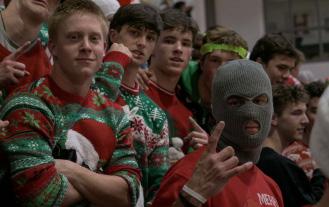
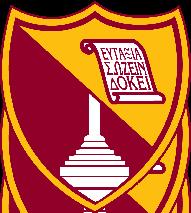
Sixth Formers stood up, shouting and yelling at their dean of students. There wasn’t a happy face in that form meeting—the student fan section had just lost the opportunity to wear cut-off jeans and white tank tops.
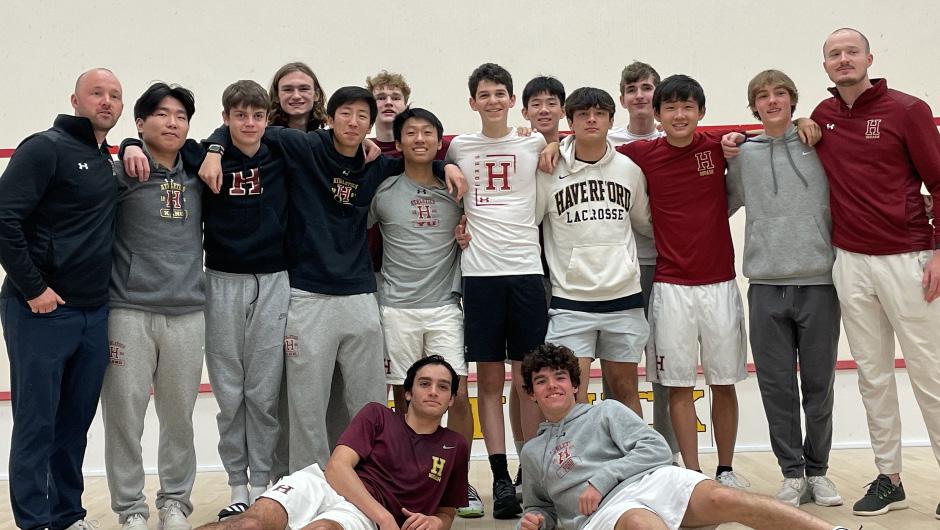
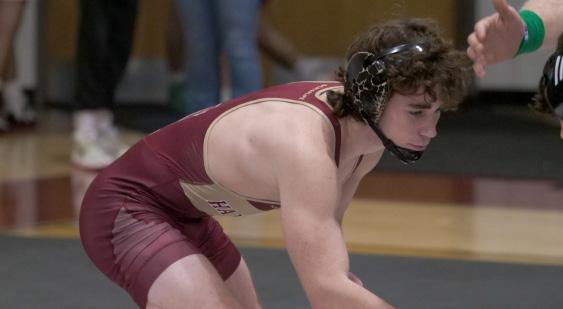
“I think that it’s just a lazy attempt to change the school,” Sixth Former Joe Pariano said.
A tradition that had been in place for several years, wearing jeans cut into the style
of shorts along with a white tank top was unique to the Fords and brought a certain presence to crucial sporting events—a presence that some took issue with.
“The jorts theme, in particular, is, either intentionally or unintentionally, mocking a specific group of people,” Dean of Students Mr. Luqman Kolade said. “Anything that mocks a specific group of people is problematic and something that we don’t want the school to be associated with.”
Upper School President Luka Sekulić acknowledges the issues that some of the administration may have.
“I know that a lot of the teachers and faculty believe that Haverford School boys are mocking people of lower-income households when it comes to wearing cutoff jeans and [white tank tops],” Sekulić said.
According to Mr. Kolade, there have been dress-related incidents in the past that have been problematic.
OpenAI’s ChatGPT’s potential impact
Artificial intelligence is nothing new. However, in this age of technology, ChatGPT, the new chatbot created by OpenAI, has quickly made a name for itself by growing faster than almost any other platform on the internet. In January, ChatGPT hit over 100 million users. In comparison, it took TikTok, a viral social media platform, over nine months to grow its user base to that size. In fact, Google searches of ChatGPT generate more than 638 million results, more interest than world-famous artists like Drake and Taylor Swift.
Artificial intelligence (AI) and machine learning involve three main steps: receiving and perceiving info, synthesizing and analyzing info, and inferring information. The last step is crucial and depends on the
data set and machine learning program nuances. The program is trained by providing feedback on the inferences it makes.
ChatGPT, or Chat Generative PreTrained Transformer, is no different than the simplest of AI programs. Where it differs from other chatbots is the size of its data set, as well as the actual technology used to interpret the data set and generate text.
ChatGPT is built off a class of machine learning called Natural Language Processing models, which are also called Large Language Models. These Large Language Models analyze large datasets of text and look for relationships between different words in the dataset. The datasets are huge: ChatGPT’s is over 500 gigabytes of pure text. In comparison, this article is only a few kilobytes of text, and a kilobyte is a million times smaller than
a gigabyte. With the recent innovations in computing and graphics cards, large language models have been able to increase their capabilities over the past few years by allowing for faster and more efficient processing of data.
Using this data, ChatGPT is able to produce responses to questions by inferring the interpretation of a prompt put into the program using the Large Language Model to produce relatively natural language and using the internet to pull specific information needed to produce a response.
Nonetheless, with its release to the public, the powerful technology of ChatGPT has found its way into classrooms across the world, including those in Wilson Hall.
“ChatGPT is a really good tool that guys are able to use,” history teacher and
“A couple [of] years ago it would be a dress-down day and we had kids in the halls in jorts, and they would be inappropriately cut, so short that you could see kids’ underwear. This made some people very uncomfortable.”
While some may be offended by it, students claim their intention is not to offend.
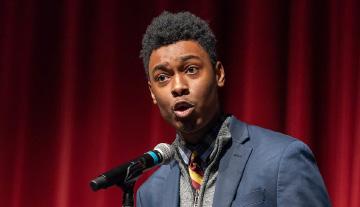
con’t on p.3
Honor Council faculty advisor Mr. Jeremy Hart said. “I’ve listened to a lot of arguments that ask, ‘What’s the difference between ChatGPT and Google?’ It really just puts all the information into one spot that is digestible.”
On the other hand, math teacher Mr. Matt Ator doesn’t see much use for the new technology in his math classes.
“I have not found it particularly useful in the math classroom so far,” Mr. Ator said. “We were doing some open-ended problems in class, and we tried to feed the questions into ChatGPT just to see what would happen. It really struggled to take the context of the problem and turn it into an answer.”
con’t on p.5

PIERCE LAVERAN ‘24
The student voice since 1888
Wrestling p. 23 PIERCE LAVERAN ‘24 Poetry Out Loud p. 6 COURTESY OF COMMUNICATIONS Squash, p. 22 COURTASY OF MICHAEL LEE Ali Islam, p. 12 ALI ISLAM ’23
90, No. 5 · thsindex.org
Student fans attend home game vs. Academy at Palumbo on December 9, 2021
the index
Ethan lee ‘24
The Haverford School · Haverford, PA 19041 · February 2023· Volume
the index
2022–2023 Staff
Jingyuan Chen ’23
Editor-in-Chief
Joey Kauffman ’23
Editor-in-Chief
Connor Pinsk ’23
Editor-in-Chief
Ethan Chan ’23
Senior Managing Editor
Owen Yu ’23
Senior Managing Editor
Ethan Lee ’24
Managing Editor
Adiyan Nayak ’24
Managing Editor
Christoper Schwarting ’24
Managing Editor
Casey Williams ’24
News Editor
Arsh Aggarwal ’24
Features Editor
Ian Rosenzweig ’25
Academics Editor
Tripp Ronon ’24
Neighborhood Editor
Connor Simpkins ’25
Campus Opnions Editor
Charlie Kiedel ‘24
Off-Campus Opinions Editor
Tripp Ronon ’24
Neighborhood Editor
Tate Conklin ’24
Sports Editor Russell Yoh ‘24
Arts Editor
Pierce Laveran ’24
Photography Editor
Ms. Emily Harnett
Faculty Advisor
Mr. Thomas Stambaugh
Faculty Advisor
The Index is a student-run publication of the Haverford School that does more than bring news: it provides the diverse perspectives of the Haverford student body. It is an outlet for student writers to take stands on issues they deem important. It chronicles the daily struggles and accomplishments of the Haverford community. The Index also provides a forum for discussion of pertinent issues, such as student culture, academic policy, and Haverford’s place in world affairs. The Index presents new ideas and aspires to influence constructive change.
All opinions and viewpoints expressed herein do not necessarily reflect those of The Index or the school. The Index is designed and produced digitally. Photographs may be retouched. Submissions and letters to the editors regarding any and all articles are welcomed at index@haverford.org
The Index, a member of the Columbia Scholastic Press Association, is composed using the applications of Google Suite and Adobe Creative Cloud. Its surveys are conducted via Google Forms and are advertised on email to current Haverford students. Graphic designs are created by Index staff via Canva. Southern Dutchess News prints 200-400 copies of each issue, and its editorial staff distributes them in the Upper School on the day of release. The Index serves the needs of a total school population of 1152 community members, consisting of 952 students and 200 faculty and staff members.
Contact The Index:
450 Lancaster Ave, Haverford, PA 19041 index@haverford.org
Twitter: @Haverford_Index
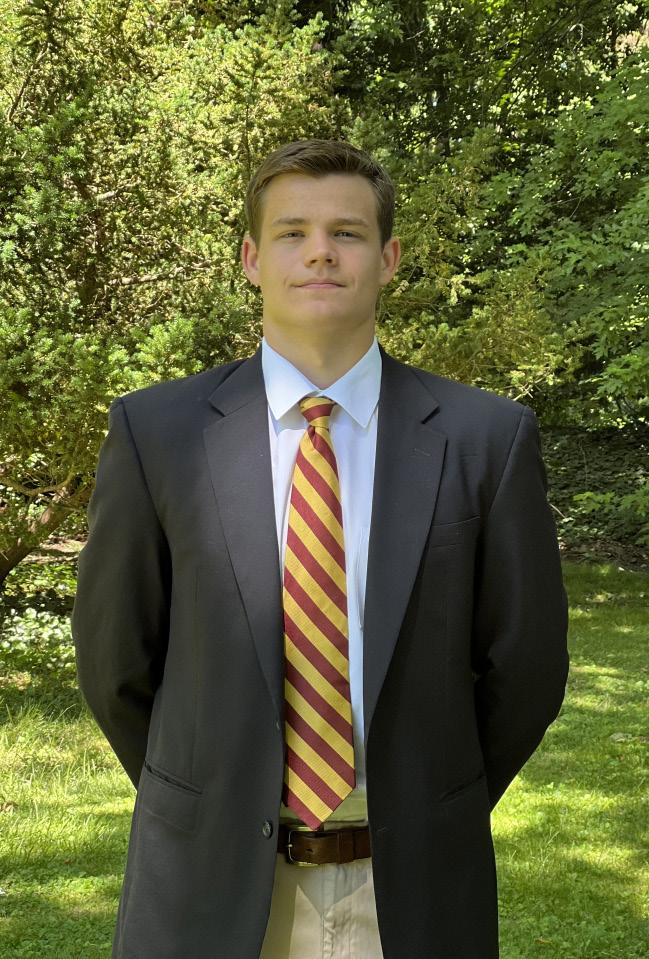
Instagram: @Haverford_Index
Volume 94, No. 5 - February 9, 2023
editorial
School strengthens community bonds
The Index returns after two months to chronicle the Haverford community’s efforts to reestablish
and strengthen community bonds. Haverford initiates 2023 with a strong emphasis on students’ mental health and
social education. The annual Human Relationships Seminar discusses topics including gender, sexuality, feminism, manhood, healthy relationships, and mental health among the members of the Haverford, Baldwin, and Agnes Irwin community.
The Peer Counseling program continues to sustain the values of brotherhood and empathy. The Gender-Sexuality Alliance works closely with faculties to improve the LGBTQ+ experience in our school community.
Beyond the standard curriculum, these programs nurture students’ emotional intelligence and signal the community’s ongoing commitment to the Haverford values that had dwindled during the years of the pandemic.
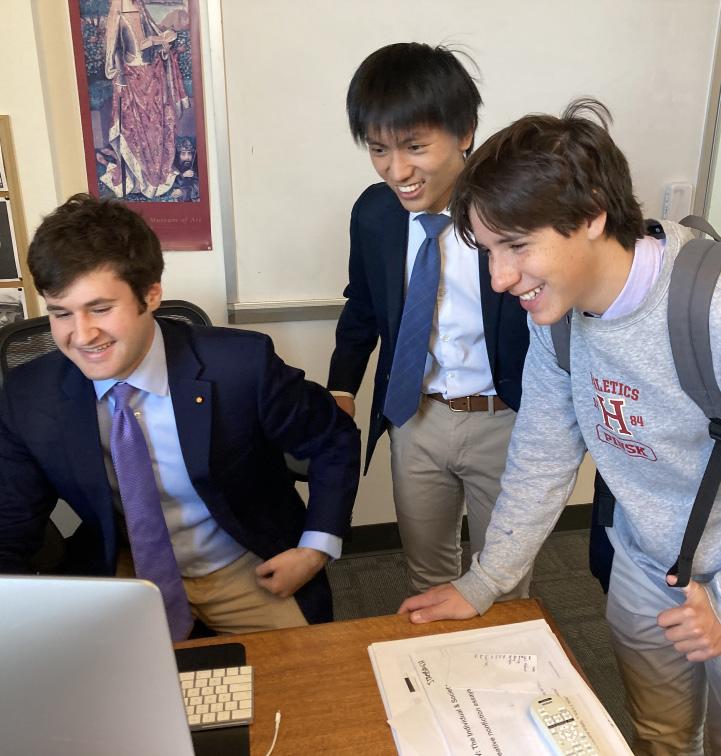
As the semester began with a fresh schedule, The Index encourages all members of the Haverford community to take advantage of this trend and self-reflect.
Do your days at school provide you with more happiness or stress? How can you adjust your life to better interact with the community and obtain happiness from those experiences?
The Index also encourages students to take advantage of the school’s resources in mental health and social education. Does one of these aforementioned programs help alleviate your concerns?
Can you contribute to the efforts of these programs and help resolve the concerns of your peers?
A healthy school culture takes root as students begin to ask themselves these questions.
Letter from the student body president
Luka Sekulic ’23
As the first semester draws to a close, we’re reminded that every ending paves the way for hope, new beginnings, and new opportunities.
As a school, in the first semester we have grown in our character, grit, and self empowerment. Now it is time to take a step further into discovering what our collective integrity will look like at the end of the year.
How do we gauge the strength of our integrity and determine our success at the end of the year? Success begins within, where one must take a self-reflective approach, acknowledging both the highlights and areas for growth, and objectively evaluating their experiences over the course of the year.
“The wise man accepts his pain, endures it, but does not add to it.” Marcus Aurelius—who was referred to as one of the five good emperors of the Roman empire, as a philosopher, known for maintaining relative peace and stability—believed that in order to succeed, you have to be willing to recognize your pain. Find it in yourself to get rid of the bad habits, keep in touch with your mental health, stay on top of your school work, and stay in touch with the student body by joining a new club, or showing out for a sporting event.
As the year draws to a close, our success will be determined by the level of commitment and discipline we demonstrate in serving our community. Holding ourselves and each other accountable for our actions and upholding our values will be key indicators of our progress and success. As Dean of Students Mr. Kolade said earlier this year, just as in sports we have to finish strong and stay motivated all the way through: the same applies to our lives. As we enter the latter half of the school year, it’s crucial to maintain our motivation and remain focused on what truly matters.
February 2023 Page 2 the index · editorial
COURTESY OF LUKA SEKULIC ’23
2022-23 Editorial Board (from left, Editors-in-Chief Joey Kauffman ‘23, Jingyuan Chen ‘23, Connor Pinsk ‘23)
MR. THOMAS STAMBAUGH
Administration bans, cont. from front page
“For a lack of a better term, it’s boys being boys,” Pariano said. “I think that the administration kind of reads into outfits and masks. We don’t really mean anything by it, it’s just something that we can all do together and it’s tradition.”
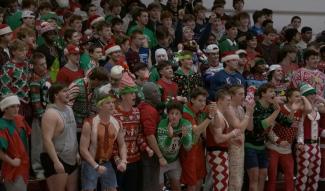
However, “boys being boys,” may not always be a good thing, an idea that the English department tries to instill in Third Form.
“One of the books everyone reads their third form year is the Lord of the Flies, and in the Lord of the Flies, when the characters paint their faces, they then do things that they wouldn’t normally do,” Mr. Kolade said, referring to the additional ban of face coverings. “It’s the act of being anonymous… and it’s the same with the ski masks at games. It provides a false sense of anonymity that can make people behave in a way that they normally would not.”
Much of the anger that the student body has with Mr. Kolade is misplaced, as he was not the one who made the decision.
“I don’t think that [Mr.] Kolade was
the person saying that he didn’t like it, and it probably sucked for him having to tell the student body that they couldn’t do it anymore,” Pariano said. “I think that there are bigger issues and things that we need to address in this school, and taking away from something we do really well, like being in the student section and truly supporting people, is not the right move. If we lose that then I think we are in a really scary place.”
The hope of much of the student body is that this is not a final decision but something that the administration may be willing to discuss further.
“I think that there will be a continued argument. I’m not sure if it will change anything, but I know for myself and some of my classmates that we still want to carry on this tradition of the [white tank tops] and the jorts,” Sixth Former Z Nekoumand said.
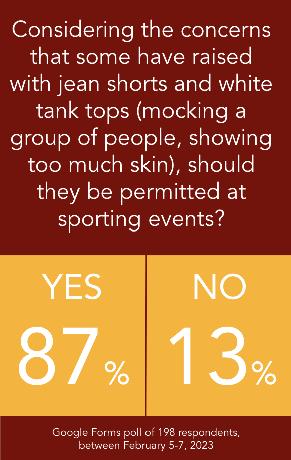
Sekulić is doing his best to achieve these wishes.
“Alongside other members of the senior community, we are trying to come to a com-
promise with the school.”
Despite the work of Sekulić and other Sixth Form leaders, many students are still upset with the situation.
“I get where the outrage comes from, but I think it’s misplaced,” Mr. Kolade said. “I think that at the end of the day, people are not going to be that mad and kids will get over it. I don’t think it’s worth sympathy because I don’t think it’s that important, like brotherhood and all those ideals we talk about are more important… I’m not sympathetic, but I understand why kids are upset.”
For some, this is another piece of problematic decision-making from the administration.
“In the last four years, with the 2023 class leading the underclassman out of COVID, [the administration] kinda just keep picking away at the Haverford student experience, making it worse, little by little,” Pariano said.
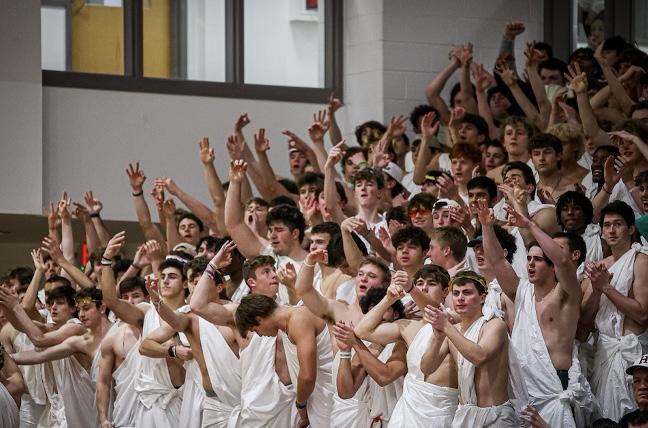
Others just want the administration to understand the students’ point of view.
“My hope is that they’ll see the high school perspective of us just wanting to look crazy, wanting to have fun at basketball games or any other sporting event,” Nekoumand said.
One thing is certain:
“The student body is not happy with the decision that has been made,” Sekulić said.
With policies that affect the student life constantly changing, it is difficult for students to acclimate to a certain type of schooling experience.
From a different schedule every year for the Sixth Formers to the removal of certain themes from the fan section that help define the school, some would say that the first thing that the school could do is tell its students why things are shifting. Others think Mr. Kolade has already explained the thinking behind the change.
“We still haven’t really heard why all this is happening,” Pariano said.
NATE BURMAN ‘25
Student section dressed in ancient Roman togas during basketball victory, 51-46 against Episcopal Academy on January 20th, 2023
the index · news February 2023 Page 3
PIERCE LAVERAN ‘24
Student section wearing “ugly sweater” theme at home game, December 9, 2022
While the chatbot did spit out a numerical answer, the process to arrive at the answer was convoluted and incorrect in many ways.
“It is probably naive of me to think this, but I don’t think that [ChatGPT] will make much of a difference in the math classroom in the way this will affect English and history classes,” Mr. Ator said. “People are going to ask ‘Why do I need to write an analysis when this can do it for me?’ Math teachers have been getting that question with calculators for years.”
With both a STEM and humanities background, Mr. Ator noted that the arrival of ChatGPT almost levels the playing field of the two disciplines.
“[ChatGPT] creates a more relatable conversation between the two disciplines,” Mr. Ator said. “In the same way that [math teachers] have been dealing with the graphing calculator, Desmos, Symbolab, there’s a more relatable thing that is affecting every class now.”
English teacher Dr. Micah Del Rosario has more of a firm stance on ChatGPT.
“I don’t like it,” Dr. Del Rosario said. “I don’t have a problem with AI inherently, more the fact that [ChatGPT] became mass available to high school students across the nation.”
Dr. Del Rosario however, does not think that the results of ChatGPT will be as bad as many are making it out to be.
was not true for anybody that has read the book carefully,” Dr. Del Rosario said. “I then asked it to put in textual evidence, and it made up quotes.”
The analytic aspect of ChatGPT is one of many shortcomings of the chatbot. Because of the program and methodology of machine learning, AIs can only repeat and make inferences from data given to them.
“When it comes to history, it is more than just the information,” Mr. Hart said. “History is about the skills: knowing how to research, knowing what a good source is, building an argument, thinking about building an argument. These things are more important than the actual content.”
Dr. Del Rosario shared similar ideas.
“The human aspect of the humanities is individual critical thinking,” Dr. Del Rosario said. “Brainstorming ideas for papers is a fundamental part of English. Students will tell me that developing and defending arguments is their favorite part of this class.”
In his classroom, Dr. Del Rosario was sure to make clear the difference between the many different uses of ChatGPT.
“Using ChatGPT to come up with a thesis feels like plagiarism to me. I don’t care whether it came from a person or a robot. You didn’t come up with the idea yourself, and that is an ugly and hypocritical thought to me, versus just using ChatGPT to check your grammar in a paragraph,” Dr. Del Rosario said.
Dean of Students Mr. Luqman Kolade also views ChatGPT as a resource for students.
“It’s a tool, like anything else,” Mr. Kolade said. “If used in the right ways, it can be beneficial. I actually suggested to a kid that if they are having trouble with any basic grammar things to use ChatGPT.”
Mr. Ator said. “We saw this with AlphaGo.”
AlphaGo was a groundbreaking AI developed to play the ancient game of Go. Before its creation, no computer program had ever defeated a professional Go player. AlphaGo accomplished this feat by using data from human matches and self-play to “solve” the game of Go, a feat previously considered impossible. This marked a significant moment in the advancement of AI and Machine Learning technology.
“[Alpha-Go] was making moves that people were totally floored by,” Mr. Ator said. “It was able to analyze data and come up with conclusions that were not intuitive to us.”
However, there is a fine line between a tool used to improve versus a tool used to cheat.
own work.”
The Honor Council has treated these cases similarly to plagiarism.
“We don’t necessarily treat it worse than plagiarism,” Davey said. “But in my personal opinion, it almost is worse than regular plagiarism as ChatGPT is designed to hide that it’s from another author or source. It feels more dishonest.”
Yet, students continue to experiment with ChatGPT as a tool.
“I haven’t used it for school work, but I have played around with ChatGPT especially when it first came out,” Third Former Jack Ford said. “The answers it produces lack vision and a greater picture.”
Other students have used it as an appendage to their work.
“I have used ChatGPT to complete my work and to supplement my work,” an anonymous Third Former said. “I don’t really know how it works.”
Many students do not know how this technology works.
“I know that it’s developed by OpenAI and that’s about it,” Fifth Former Render Ford said. “I don’t really see how it is different from Google and a calculator.”
“I don’t want to be apocalyptic about this new technology,” Dr. Del Rosario said. “It is not the end of high school education or anything like that.”
Mr. Hart agrees with this sentiment.
“The initial reaction that everyone was really nervous that ChatGPT would end writing and research was a little overblown,” Mr. Hart said. “It is a new tool. The introduction of the internet was seen as the end of researching and here we are.”
Dr. Del Rosario also noted the many shortcomings of the platform’s writing.
“In class, I did an exercise where I punched in the prompt ‘Write me an essay on masculinity in [The Brief Wondrous Life of] Oscar Wao,’ and what it came up with
Mr. Ator views this moment of changing technology as an opportunity to improve teaching.
“[ChatGPT] can lead everybody to a conversation about how we are asking questions so that we are acknowledging the tools that exist,” Mr. Ator said. “You have a calculator, you have ChatGPT. How can we use that to enhance your knowledge instead of making you do everything on paper. What’s the purpose in that?”
Mr. Ator also believes that AI can be an incredibly useful tool to make connections that humans would not normally make.
“As AIs develop larger databases and are able to glean more from them, you are going to have these neural networks that are able to make connections that humans haven’t,”
“Some students will use shortcuts, as students have always done,” Mr. Kolade said. “Our job as educators is to assess student work, not assess ChatGPT’s work.”
ChatGPT is not a tool that creates original content: it merely recycles content from its database.
“Again, we want to assess student work, we want to make sure that our students are capable of doing something,” Mr. Kolade said. “It is not, ‘what can a student plug into ChatGPT?’ And as such, if you submit work that is not your own, it will be treated as such.”
The Honor Council has already received cases involving the use of ChatGPT to cheat.
“When it comes to the Honor Council, the [ChatGPT] cases that we have violated question one of the Honor Code: ‘Does this action mislead or deceive?’ and question 2: ‘Does this action give me an unfair advantage?’” Mr. Hart said.
Honor Council Chairman Ryan Davey agrees with the idea of ChatGPT being unacceptable when used to cheat.
“Bottom line, [ChatGPT] is no different from regular academic dishonesty,” Davey said. “It’s still taking work that is not your own and trying to pass it as your own. It is the expectation that you submit your
With this in mind, teachers in the upper school have begun to tackle ChatGPT in their classrooms.
“Today’s ChatGPT is the Sparknotes of ten years ago,” Mr. Hart said. “It’s all about…teaching you guys to use the right tools and use the tools correctly.”
Teachers all over the upper school have discussed ChatGPT at great length in the classroom, as well as doing exercises that demonstrate ChatGPT’s strengths and weaknesses.
Mr. Ator’s Advance Topics in Math* class has recently added a book called Mathematical Intelligence to its curriculum in order to try and bring some understanding to the closed-door nature of AI programs.
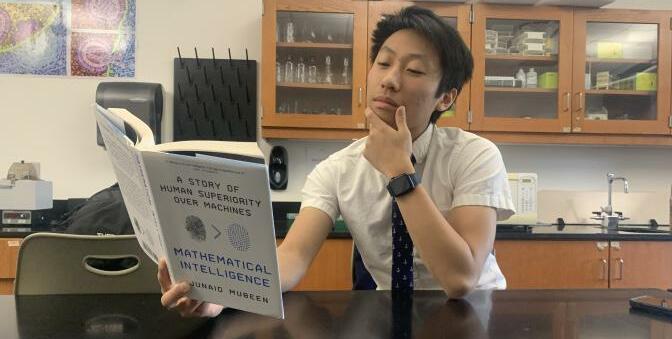
“[The book] explores the way that humans think, particularly through the lens of mathematics that inanimate AI can’t,” Mr. Ator said. “We have creativity, the ability of estimation, the ability to work in groups, [that] sets us apart from AI.”
The book was published in November of 2022 and references many of the innovations that led to the advent of ChatGPT.
“We need to be critical of not personifying these things and saying ‘It thinks this.’ It doesn’t think,” Mr. Ator said. “It’s a database that’s kicking out information. It’s still up to us to do the thinking.”
the index · news February 2023 Page 4
OpenAI’s ChatGPT’s potential impact, cont. from front page
ETHAN LEE
Owen Yu ’23 ponders the subject of mathematical intelligence as he examines Junaid Mubeen’s A Story of Human Superiority Over Machines
’24
I don’t want to be apocalyptic about this new technology.
DR. MICAH DEL ROSARIO
Our job as educators is to assess student work, not assess ChatGPT’s work.
MR. LUQMAN KOLADE
Asian community members respond to LNY attacks
To two of Haverford’s Pan-Asian Alliance leaders, Fifth Former Justin Fan and Sixth Former Ethan Chan, the Lunar New Year is about festivity, hope, good fortune, and celebration. According to Fan, the holiday “seeks to unite” the Asian community despite diversity and differences. But rather than being a joyous time filled with good fortune, 2023’s Lunar New Year was marred by a mass shooting at a celebration in Monterey Park, California, which left eleven Asian victims dead and nine more wounded.
Because good spirits are almost a prerequisite of the Lunar New Year, Fan found the attack especially surprising.

it needs to be discussed more,” Chan said.
Fan said, “In a sense, [the shooter being Asian] feels like a betrayal. Because of how small our communities are, there’s a special trust and bond that forms.”
thought we finally belonged with,” Fan said. Even with the rise in anti-Asian crime, some members of Haverford’s PanAsian community feel that their voices aren’t always heard.
“For a lot of the cultures in Asia, [Lunar New Year] is always a celebration based around starting a new year, good luck, and family. To witness such an event… was just shocking,” Fan said. “It felt hurtful that someone would take the opportunity of such a festive moment and ruin it with such a devious act.”
While the shooting has been widely represented as a hate crime, the shooter himself was Asian. This detail raises a question about motive: was the shooter targeting Asians because of race and culture, or was his crime otherwise motivated?
Despite the shooter’s identity, Chan believes that the shooting was still race-based.
“Asian hate isn’t just perpetuated by those who aren’t Asian, but also by groups and individuals who have a flawed perception of Asians and are motivated by wrong and often malicious intentions. It is a racebased hate crime through and through, and
Although the shooting in Monterey Park was the first to receive significant media attention in recent months, hate crimes against Asians are far from rare. The Center for the Study of Hate and Extremism reported a 339% rise in anti-Asian hate crimes in 2021. The influx of Asian hate can be at least partially attributed to the COVID-19 pandemic. As the coronavirus was first identified in Wuhan, China, some prominent figures blamed China for the virus’s spread. Former President Donald Trump referred to COVID-19 as the “China virus” and the “kung flu.”
While such remarks do not inspire violence or call for hate against Asian people, they represent the broad and highly public sentiment that China was at fault for the pandemic. That belief itself inspired violence against entire Asian communities in the United States in 2020 and 2021.
“When COVID hit and we got rushed to the forefront of attacks and hate sentiment, it was surprising, but also hurtful because we weren’t expecting such a reaction from the people that surrounded us, who we
ETHAN CHAN ’23
“Relatively speaking, Asians haven’t gotten enough representation as a minority,” Chan said. “While the Diversity, Equity, and Inclusion agenda has been pushed, especially the last three years, not a significant amount of work has been done to truly recognize Asian problems. Part of observing a culture and ethnicity is not only to celebrate with them but also understand the problems they deal with.”
Fan agreed with Chan, and also expressed that Asian hate is part of a bigger
problem in the U.S.: xenophobia. Although the U.S. has long been a land of immigrants, nationalistic, hateful, and xenophobic sentiments are growing. As DEI work remains a focus of the United States and the school community, representation is important.

ETHAN CHAN ’23
Hate is toxic, and it spreads. The Asian-American community at school confronts racism and xenophobia head-on, and they hope to make change in the wake of pain.
“I hope people can learn from these injustices,” Chan said. “I hope we can unite as a community to collectively stand up to racial and cultural inequality as a whole.”
Ian Rosenzweig ’25
Lunar New Year celebration in Chinatown NYC, February 13, 2005
EXPLOR CHINATOWN VIA WIKIMEDIA COMMONS
“Part of observing a culture and ethnicity is not only to celebrate with them but also understand the problems they deal with.”
“It felt hurtful that someone would take the opportunity of such a festive moment and ruin it with such a devious act.”
news the index · news February 2023 Page 5
JUSTIN FAN ’24
“I hope we can unite as a community to collectively stand up to racial and cultural inequality as a whole.”
Check out all articles at thsindex.org
Plumer-Butler crushes Poetry Out Loud Contest
In the past month, you may have found yourself browsing the Poetry Out Loud website, searching for the perfect poem to present to your English class. However, for many students, these late-night rehearsals had much higher stakes.
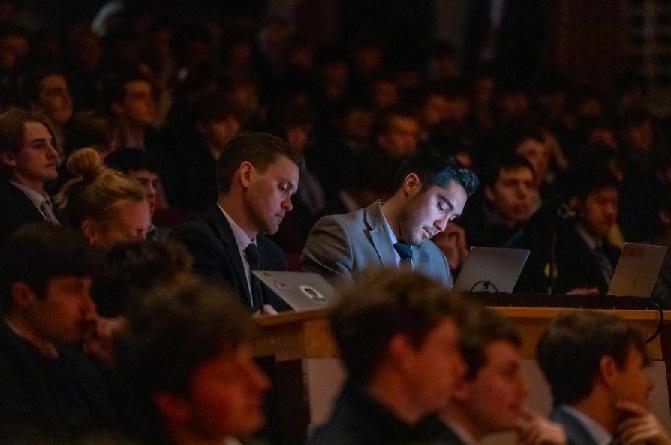
Each spring, high school students from across the country compete in Poetry Out Loud. The contest begins within schools and then moves to the regional, state, and national levels. To compete, students must memorize poems from the Poetry Out Loud website and deliver them with confidence and passion in order to progress.
Upper school English teacher Ms. Taylor Smith-Kan has witnessed our success as the organizer of the competition for the past eight years.
“I think our success comes from the fact that we’re a really competitive school, and any kind of competition we throw at kids, they’re gonna take on,” Ms. Smith-Kan said. “When they get up there it’s like they’ve competed before; they’ve been in front of adults and been judged before, so I think we’re good at rising to the occasion of something like this.”
This sense of competition was evident in the school-wide competition on January 13, when five students competed for a chance to represent the school at the regional level.
Sixth Former Jasir Plumer-Butler won the faculty judges over with his composed and passionate performance.
“It didn’t take me that long to memorize the poems, but it was stressful for me to get it all down and make sure I was delivering it the way I wanted to,” Plumer-Butler said. “In the end, I think it really just came down to my confidence and asking myself, ‘Can I do this? Am I able to deliver this poem the right way?’”
Plumer-Butler’s passion for poetry
played a large role in his decision to compete.
“It’s my way of expressing emotion,” Plumer-Butler said. “Even if it’s not my own work, it’s still expressing emotion, and I think [writing] is a very important aspect of communication with everyone and yourself.”
According to Ms. Smith-Kan, having this personal connection to the words is the only way to succeed.
“This year, Jasir chose some cool and funky poems that he could also connect to,” Ms. Smith-Kan said. “I think that is a prerequisite and it definitely has been true for all of the kids who have won.”
Competing in the Poetry Out Loud Contest is bigger than a personal accom-
plishment. Competing can benefit the community in many ways.
“What I love about it as an English teacher is that rarely are we able to show what we do in an English classroom because people aren’t going to sit down and read your analytical essays. But they can see and hear this,” Ms. Smith-Kan said. “It’s a visible, tangible way of showing what we do in an English class.”
The contest also reveals talents that many students and faculty members might not be aware of.
“It’s showing a diversity of skills,” Ms. Smith-Kan said. “There have been kids over the years on stage who were total athletes
and not known for their academic prowess and ended up doing really well. How cool is that, that you show yourself and others you can do something that you didn’t know you could do?”
Plumer-Butler echoed these beliefs and expressed a desire for the whole community to get involved in the contest and share their skills.
“It’s fun, and for other people, I’d say just it’s something new,” Plumer-Butler said. “Especially if you’re doing it with other people. It can be really fun to do with friends.”
Ms. Smith-Kan believes that getting out of your comfort zone is what makes competing worth it.
“If I had to do this in high school, it would terrify me because I don’t love speaking in front of people,” Ms. Smith Kan said. “I think that is the reason why everyone should do it. It’s such a good skill to be able to stand up in front of people and present something that you’re proud of.”
To Plumer-Butler, reading poetry is about more than just reciting words, and he stresses the importance of this art form.
“Poetry can be anything: thoughts, just a story, but it’s just really important that we have these outlets of communicating because they can help us display emotions to other people. They can help us figure out how we’re feeling,” Plumer-Butler said. “I think it’s good to have that outlet.”
Plumer-Butler carries his passion for poetry into regionals and hopes to stand out with his authenticity.
“I’m gonna just get up there and think, ‘Let me just do my thing’, you know?”
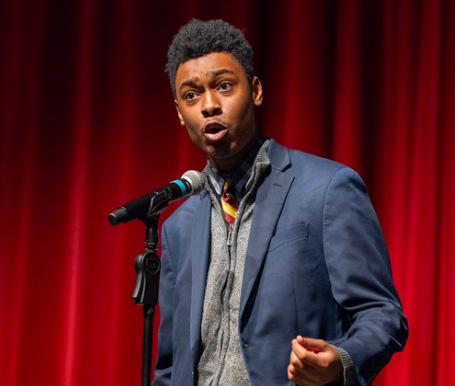
COURTASY OF COMMUNICATIONS
Tate Conklin ’24
“I’m gonna just get up there and think, ‘Let me just do my thing’, you know?
the index · news February 2023 Page 6
JASIR PLUMER-BUTLER ’23
COURTESY OF COMMUNICATIONS
The judges of the Poetry Out Loud Assembly take notes on the performances, January 13, 2023
School contest winner Jasir Plumer-Butler ’23 performs at the Poetry Out Loud Assembly, January 13, 2023
“It’s a visible, tangible way of showing what we do in an English class.”
MS. TAYLOR SMITH-KAN
The Human Relationships Seminar: the value of understanding human relationships
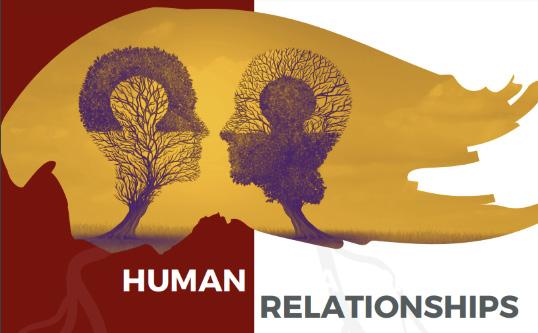
Understanding why humans interact is valuable; all of human history can be explained through careful analysis of human relationships between people from all walks of life. However, many people today, especially high schoolers, are ignorant of modern human relationships.
This is exactly what the Human Relationships Seminar, held weekly for juniors and seniors from Haverford, Baldwin, and Agnis Irwin sets out to do.
The seminar holds student-driven, discussion-based meetings, gathering weekly on different topics including healthy views towards gender, sexuality, feminism, manhood, as well as healthy relationships and mental health. Guided by five teachers from Haverford, Baldwin, and AIS, including history teacher Dr. Bridget Gurtler and English teachers Dr. Del Rosario and Ms. Harnett, the Human Relationships Seminar is a popular optional course among the students. In fact, Haverford’s applications alone were competitive enough to have an acceptance rate around 50%. But why is such a class so popular when the subject matter—human interaction—may seem intuitive?
It’s not surprising to think that just in day-to-day interactions most people know a lot about human relationships, but that’s not entirely the case. According to Dr. Del Rosario, while topics like race and sexuality may come up in a history or English class, those conversations merely reach the tip of the iceberg.
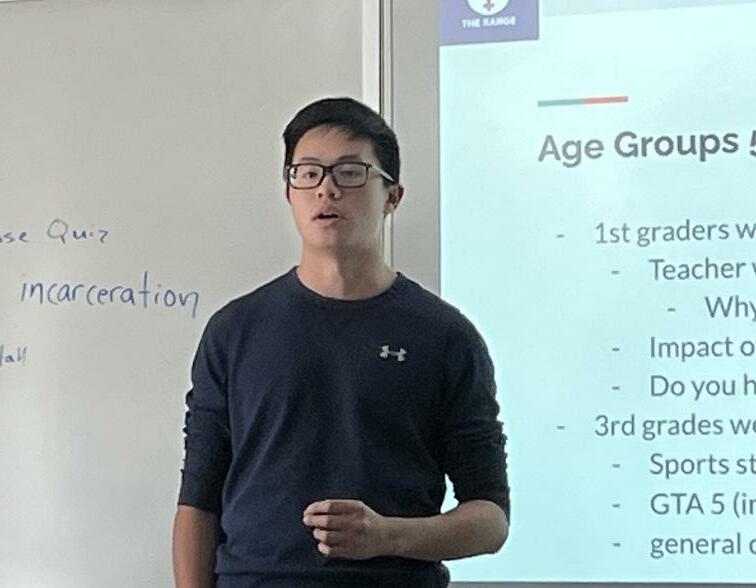
“As an adult, I would suggest that when you are sixteen to seventeen, you don’t know that much about the world. Your experience is still limited,” Dr. Del Rosaio said. “It’s not just that you’re young, but you’ve spent your life in one place.”
In addition, there may also be topics that students may be aware of but don’t know much about or entirely new topics where a student might not know anything at all.
“There are known unknowns and there are unknown unknowns,” said Dr. Del Rosario.
Providing a comfortable space to explore these topics fully among peers with vastly different experiences fosters thoughtful discussion and, hopefully, “an excitingly eye-opening, humbling experience,” Dr. Del Rosario said.
“We [teachers] are thinking about what’s important to our students personally when they leave Haverford, and it’s gonna be this question of relationships. What makes someone’s someone’s life fulfilling and meaningful? If you asked someone that question, what would they say?” Ms. Harnett said. “Many people, and I think rightly, would describe their relationships with others to be the things most important… It’s an opportunity for students to discuss the really pressing questions about who we are as human beings and how we relate to one another.”
Dr. Del Rosario and Ms. Harnett, as
well as many students who have applied to the course, have expressed that the content of this course is both appropriate and would be incredibly valuable in the school’s wider curriculum. The application process, with priority given to Sixth Formers and those who haven’t taken the course before, aims to find a range of beliefs and different opinions, perspectives, backgrounds, and the ability to articulate a unique perspective. Leaders think that in order to “prepare boys for life,” these topics must be discussed, regardless of age or maturity.
The topics for the course, especially sexual identity, consent, mental health, and the process of maintaining and creating healthy relationships, may not come up in the standard curriculum. Conversations about these topics can prevent dangerous misconceptions or filter out false information that students may never realize until later in life. A misunderstanding of the meaning of consent, or an underdeveloped, misleading idea
on the history of African American civil justice, can have disastrous consequences on a person’s opinions and reactions.
As Fifth Form Human Relationships Seminar student Tripp Ronan put it, “You can either learn them the easy way or the hard way.”
“The topics in Human Relationships [don’t] seem like they should be taught in a classroom, but they absolutely should be,” Ronan said. “A deep understanding of these topics is necessary to be human, to begin with.”
This environment allows the students and teachers to focus on big-picture questions. One of the bigger aims of this course is to assess whether each individual student can consider themselves a good person.
“The way we answer that question is by looking at how we treat people very close to us,” Ms. Harnett said. “Most of us are not powerful enough, not important enough, to affect that many people beyond the people
we are in relationships with. When it comes to assessing moral character, the first place we look is our relationships.”
The value of studying and analyzing healthy human relationships goes beyond just learning about greater problems in the world: it can affect our own personal lives, happiness, and the people around us.
“I want my students, above all else, more than being good readers or writers, to be good people,” Ms. Harnett said. “In order for Haverford as an institution to achieve that goal, we have to teach others how to have good relationships.”
The lack of education on understanding the intricacies of human relationships is not often taught, and this makes the value of the course all the more apparent.
“In life, you don’t have to take away facts from the Civil War or how to find the derivative,” Ronan said, “but regardless of who you are, you will be involved in some way in the contents of human relationships.”
DYLAN KAO ‘23 COURTASY OF SEAN NGO ‘23 The logo for the Human Relationships course, which began on February 8, 2023. the index · news February 2023 Page 7
Sean Ngo ’24
“It’s an opportunity for students to discuss the really pressing questions about who we are as human beings and how we relate to one another.”
MS. EMILY HARNETT
Ethan Chan ’23 presents his work in Dr. Gurtler’s History of Science Sex and Culture* class.
Peer Counseling: the purest form of brotherhood
Asea of Fifth and Sixth Formers pile into Room 100. They stand shoulder-to-shoulder, some against window sills and others hugging the walls. Pizza fills the space, but eating is not the priority. Instead, a wave of empathy wafts through the crowd as countless individual conversations begin. The front of the room eventually draws the attention: a single student speaks, and previous worries, stresses, and pressures dissipate.
Open only to Fifth and Sixth Formers, Peer Counseling has provided support for students since its establishment. Dr. Michael Reichert, consulting psychologist for Haverford, first started the program over 30 years ago, and it has since evolved into an acclaimed treasure of the upper school experience.
Peer Counseling sessions occur once every other week, and they are split into two phases. One half consists of one-on-one conversations with another student, in which one student will listen to another student speak until they switch roles. Throughout this period, students can speak about anything, and the leaders place emphasis on listening rather than attempting to give advice. The second half, called a “demonstration,” involves a single student discussing their thoughts with Dr. Reichert while others listen. Although each individual experience is different, Peer Counseling focuses on voicing one’s thoughts and listening to others’ experiences as a way to relieve personal tension.
“The premise of the program is that humans are essentially equipped from birth to free ourselves from things that upset us and clear our minds so that we can think more clearly,” Upper School Counselor and Peer Counseling faculty leader Mrs. Janet Heed said. “But what that requires is being able to sit with someone who will listen to you and notice how you’re feeling.”
With busy schedules and daunting responsibilities, distress can rapidly build within high schoolers. Boys especially neglect the necessary emotional expression to release this stress, which may explain Peer Counseling’s effectiveness.
“What I think is so important about
this program at Haverford is that boys in particular have not had much opportunity to practice this skill,” Mrs. Heed said. “Boys are constantly given the message when they are little to be tough, to suck it up, to not show emotions. There are times in life that you want to be tough, but there are many times in life that you need to be able to discharge the emotions you are feeling or it’ll never go away.”
At its core, Peer Counseling is a collaborative experience. Jaiden Shuchman, one of the Sixth Form Peer Counseling leaders, values the ability to absorb others’ perspectives during moments of self-reflection.
“Whether you’re having trouble with your own problems or you just want to sit and listen and talk with someone, [Peer Counseling] really allows you to gain a broader perspective of the world around you,” Shuchman said. “It allows you to see your own problems and experiences in other people’s light. You begin to look at everything in the third person, which is a little easier to comprehend and see things. It gives you that opportunity to step back and really understand yourself.”
With its welcoming atmosphere and supportive community, Peer Counseling attracts students across the entire student body.
“I remember my first Peer Counseling experience and seeing that there was the starting quarterback on the football team, but there was also the lead in the musical and someone who was really into science,” Shuchman said. “It didn’t matter what their position [in school] was. All of them were together in the same room for the same goal of coming together and reaching a common understanding about themselves and others.”
For many Peer Counseling participants, this diversity makes Peer Counseling sessions so effective and unique.
“Such a diverse group allows for so many different stories and experiences to be shared,” Michael Dean, a Sixth Form Peer Counseling leader, said. “Whether it’s athletics or academic work or the arts, being able to hear everyone’s experiences is really cool, and it’s definitely something I hadn’t thought of before [Peer Counseling]. And I think that’s what makes Peer Counseling so special.
It brings all the outside groups together, and I think that’s definitely where brotherhood can really be seen.”
Through Peer Counseling, Dean has found commonality during moments of perceived isolation.
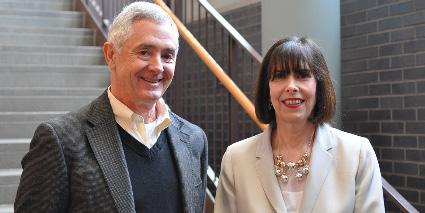
“Realizing that a lot of people in [Peer Counseling] had similar things going on to me made me realize that I was not alone with everything,” Dean said. “Even though my problems are my own, there’s so many people that have similar things going on that I know that if I need help I can reach out to so many people. I think that’s what motivated me to come back and see all of the unique perspectives.”
During a demonstration, when all eyes are centered on the speaker, Dean has felt Peer Counseling’s camaraderie.
“From personal experience, [giving a demonstration] can be really [nerve wracking],” Dean said. “But once you start talking, all of the nerves go away. When you look around and see everyone focused on you, you can feel the brotherhood and the community—that everyone is listening, that everyone is focused on you and what you have to say.”
Ultimately, the program’s culture is largely cultivated by the participants.
the room” culture fosters the genuine, vulnerable experiences that many students value in Peer Counseling.
“Whatever we say [during Peer Counseling sessions] stays in the space,” Dean said. “Especially if it’s the person giving the demonstration, you’re not supposed to go up to them and talk about what they said. And I think having your word be so safe allows for a lot of students to feel more relaxed and more open about talking about what’s going on in their lives.”
Even for observers, these demonstrations can evoke powerful emotions.
“During my first Peer Counseling session, when [the student giving the demonstration] talked, it really resonated with me,” Sixth Form Peer Counseling Co-Leader Willys Silvers said. “Afterwards, I just kind of sat with it, and I think it might have been the first time I had cried in years. I just let it out. It was so, like, it was such a foreign experience. But it was also so relieving afterwards that I had to come back again.”
The acceptance and appreciation of these moments of emotional expression are the foundations for Peer Counseling’s unique community.
“Especially in high school, there are moments when you have to hold [emotions] back and you’re in fear that someone is going to make fun of you,” Silvers said. “But everyone in Peer Counseling is so passionate about the space that you can feel at home and you can feel okay to say what you need to say.”
Silvers highlights that each experience is different and that it is the individual student who dictates their session.
“You don’t have to go in and cry,” Silvers said. “If nothing happens, then nothing happens. It may not be for you, but there is no harm in trying it out.”
“Kids recognize how special it is to have this environment where you can say anything that you can’t say anywhere else,” Mrs. Heed said. “It’s something they take really good care of because it is so precious to them. The heart of [Peer Counseling] are the students.”
The “what is said in the room stays in
Shuchman echoes Silvers’ statements and emphasizes that the program is inherently beneficial.
“I just think everyone should give Peer Counseling a chance—everyone should give it a shot. It’s only beneficial,” Shuchman said. “There’s no possible detriment it can have to you.”
COURTESY OF COMMUNICATIONS
Consulting School Psychologist Dr. Michael Reichert and Upper School Counselor Mrs. Janet Heed
features the index · features February 2023 Page 8
Owen Yu ’23
“Kids recognize how special it is to have this environment where you can say anything that you can’t say anywhere else.”
MRS. JANET HEED
The GSA: Empowering diversity
The Gender Sexuality Alliance (GSA) is an affinity group for students and teachers who either identify as members of the LGBTQ+ community or as allies, united against homophobia and transphobia. The GSA meets every Friday in a classroom of one of its faculty advisors to discuss current events and issues within the school or world that affect LGBTQ+ individuals.
During a meeting early in the year, the club discovered Haverford is one of the only all-boys private schools with an active GSA. St. Albans, the school where Mr. Castertano was previously Assistant Head of School, has an active GSA as well.
History teacher Dr. Bridget Gurtler, who teaches the history elective The History of Science, Sex, and Culture* while also leading the Human Relationships Seminar and advising the GSA, is familiar with the LGBTQ+ experience. She brings her knowledge of gay history and involvement with the LGBTQ+ community at Haverford.
“We have a wonderful cadre of faculty that are supporting the group. It is a wonderful space in which to build community and discuss issues that are important to LGBTQ+ students and faculty,” Dr. Gurtler said. History Department Chair and US History* teacher Ms. Hannah Turlish makes LGBTQ+ students feel safe in her room to voice their opinions whether in class or in individual conversations.
“I think I’ve been part of the GSA for about five or six years, both with virtual Zoom and back in person,” Ms. Turlish said. “Once Mr. Jobs moved on to Abington Friends, I guess I’ve become more of a lead advisor as faculty with Dr. Gurtler. I really want it to be a student-run group because I think that [the student leaders] are so skilled at that in terms of setting agendas and discussion plans, etc. I also hope that I can serve as a guide for conversation in ways to problem-solve as opposed to simply talking about problems.”
Anyone with an open mind is welcome to join a meeting and take part in discussions to express their emotions and opinions on any given topic. Topics covered in past meetings this year include the overturn of Roe v. Wade, the “Don’t Say Gay” Bill, the Respect for Marriage Act, the rise of Christian nationalism, and the increased amount of government-sponsored transphobia. The GSA also aims to boost representation of LGBTQ+ identities within the school.
In previous years, the Diversity Alliance has worked with DEI Head Ms. Rhonda Brown to introduce more books written by LGBTQ+ authors and stories that represent LGBTQ+ identity in the libraries.
After the events of last year, the GSA has focused on rebranding itself. New GSA leaders, Fifth Formers Jai Bonaparte and Bobby Popky, stress the importance of opening up the club to all members of the Haverford brotherhood and its community.
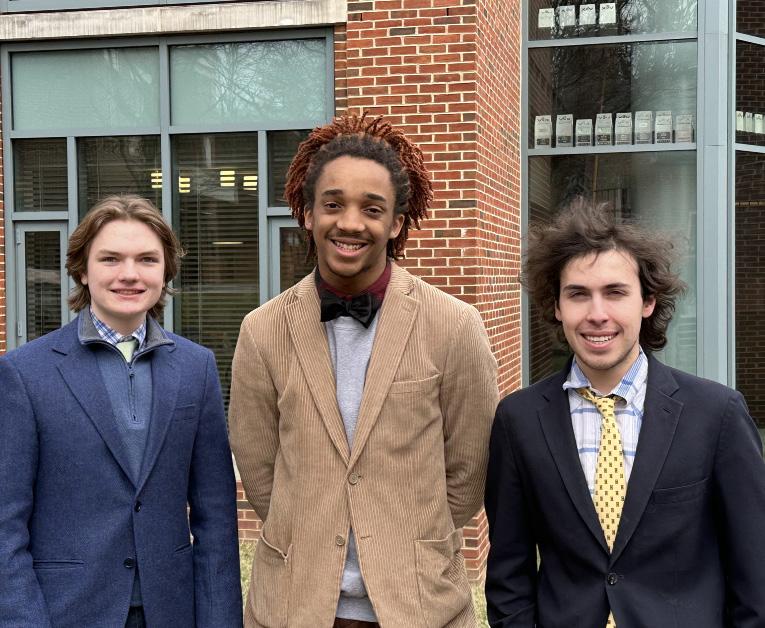
“Bobby and I crafted a long list of goals to achieve within the 2022-2023 school year,” Bonaparte said. “So far, meetings have been made more widely accessible, and new leadership has been selected. We have also hosted multiple successful group discussions and executed a joint movie night with Agnes Irwin and Baldwin’s GSA programs. Our number-one goal was to build a community, and that we have done both in and outside of Haverford’s circle. Hosting more events is still on our radar, but for the first semester we found it necessary to prioritize regaining that sense of community.”
The club started thinking about ways to improve the group as early as the summer, hoping that the GSA would become a space for more students in the community and grow its reach.
“One thing that was extremely important to us was a strict open-door policy,” Bonaparte said. “Since the beginning, we have both made it clear that anyone interested in sitting in on a conversation is more than welcome, and so far, this has been more than successful. This year the GSA has garnered more returning members than recorded in previous years. For that, we are incredibly grateful.”
Furthermore, having a GSA provides an opportunity to hear voices and opinions that are often not showcased at the school. Any and all minds are welcomed.
“GSA means community. Haverford’s GSA at its forefront is a safe space. A space where everyone should feel they can express
walking back to Crosman Hall, one might recall hearing gay jokes along with other insults to the stereotypically gay male speaker. The GSA exists to bring awareness to the homophobia within the school and curtail the spread of it.
“The community Haverford has managed to create over the years for its students and faculty is quite exceptional. The school creates tight-knit bonds between its members, sometimes withstanding even the more difficult challenges and often lasting lifetimes,” Bonaparte said. “Within these communities, many share similar views and ideologies. That is something we’d like to see change. Non-heteronormative conversations around gender, sexuality, and identity are too often met with blank stares and whispers, and more often are met with negative comments and the spread of misinformation. That is a problem. We hope that in due time, as the GSA continues to grow, changes in the general education of LGBTQ+ matters at Haverford can grow with it.”
As the GSA is relatively new, members believe only three things can be said about it: it’s here, it’s LGBTQ+, and it’s not going anywhere—gay people deserve to be seen and heard at this school.
LGBTQ+ clubs to socialize and get to know people from similar groups and different schools.”
Likewise, Natalie Suplick ’25, Head of Agnes Irwin’s GSA Compass said, “I strongly believe it’s important to have intercommunication, because meeting other people outside of school increases the support you have inside and outside of school. I feel that it is especially important for people who go to single-sex schools to meet others who can offer diverse opinions and views…Just because you go to an all-girls school doesn’t mean everyone there identifies as a girl.”
Haverford has a large gay student population, some of whom may be closeted, and others who are out. Members of the GSA come from all different back grounds in terms of race, religion, homelife, or socioeconomic status. All these factors contribute to a unique LGBTQ+ experience that shapes character and how one views the world they grow up in.
any opinions or concerns free of judgment. It is fundamental that within GSA a trustworthy community is present,” Bonaparte said. “A stable community is the foundation GSA stands on.”
Some students feel that the majority of conversations at school revolve around heteronormative topics. When gay issues are brought up in class, they are sometimes met with jokes or an awkward silence. Homophobia at school may not directly jump out at you, but many note that it exists behind closed doors, in whispers down the hallways, or in the occasional ‘f-slur’ heard in the locker room. For the majority of the upper school, the first public mention of gayness came in an assembly in middle school about the different diversity groups at the school. After leaving Ball Auditorium and
“We hope that one day the GSA can be something more than what most students would give a passing glance to, and we hope that in the future, the GSA will help to remove the stigma around ideas of LGBTQ+ topics at Haverford,” Bonaparte said.
The Haverford GSA hosts community events with other local private schools such as Agnes Irwin, Baldwin, and sometimes Shipley. These events include movie nights and group discussions over pizza dinners.
“Bringing the several LGBTQ+ groups from across the district allows for new connections and friendships with fellow LGBT members. Bringing people together this way helps produce more meaningful conversations within the community,” Atlas Viroslav ’25 Head Baldwin’s GSA Spectrum said. “For example, in October, GSA, Compass, and Spectrum joined in watching Rocky Horror Picture Show with a group discussion afterwards. This was incredibly helpful not only for the heads, but members of these
Joining the GSA doesn’t all of the sudden make you gay, nor does it emasculate you. In fact, it shows that you care. It provides a support system for LGBTQ+ kids who may not feel like the majority of their peers.
Student Body President, Luka Sekulić, is not part of the GSA, but he is still an ally.
“Not everybody is the same, and that’s the beauty of Haverford,” Sekulić said. “We’re all different, and that’s what makes us so good at everything. Allowing LGBTQ+ students to be themselves is very important, [and] Haverford has to do a better job at embracing our differences in order for us to continue down a path of success.”
Liam French ’25
CHRISTOPHER SCHWARTING
“GSA means community. Haverford’s GSA at its forefront is a safe space. A space where everyone should feel they can express any opinions or concerns free of judgement.”
the index · features February 2023 Page 9
JAI BONAPARTE ’24
Heads of GSA Tripp Ronon, Jai Bonaparte, Bobby Popky (all ’24)
“Not everybody is the same, and that’s the beauty of Haverford.”
LUKA SEKULIĆ
Mr. Mastronardi’s insights, one semester in
Render
Music teacher Mr. Matt Mastronardi accepted many responsibilities after joining the school’s faculty in September. On top of teaching classes, he has been the director of the Notables and the Glee Club for the last four months. This is just one of many factors that made his experience as a new teacher different from the experience of others taking on a similar role. Another factor is that he accepted the job on short notice.
“I didn’t have much framework to jump into other than, you know, just the description of the course,” Mr. Mastronardi said.
Despite the tough circumstances that surrounded the start of his teaching career at Haverford, Mr. Mastronardi has taken on his new roles with enthusiasm and expertise. He brings a musical theater background to the classroom, with experience as an actor in Philadelphia, a teacher at multiple theaters, and a music director for numerous productions. Additionally, he has worked on the spring musicals at Haverford since 2017, so he is not a newcomer to the community. Throughout the first semester, it has been Mr. Mastronardi’s goal to find his own identity as a teacher and bring his unique perspective to his lessons.
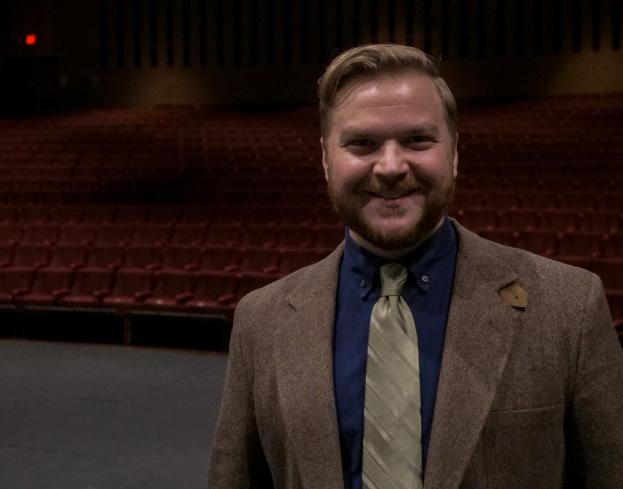
“[I have been] shaping the classes to what are my strengths, what I can give the students,” Mr. Mastronardi said. “Knowing what worked for me, how can I share that and help build that sense of confidence in the students?”
Based on these principles, Mr. Mastronardi has been planning classes as well as handling rehearsals for the Notables and the Glee Club every day. He feels like he is getting the hang of time management and the many other obligations that come with being a teacher.
“I learned a lot from the first semester,”
Mr. Mastronardi said. “It’s been an adjustment for sure, but I definitely feel like I’m starting to get the flow, and it’s starting to become a little easier to plan for everything.”
Mr. Mastronardi is excited to have a strong foundation for his future classes. He
knows what to expect of the students and the material he is teaching. With ample time on his hands this summer, Mr. Mastronardi has an optimistic outlook on what is to come.
“I’m looking forward to having this summer to plan,” Mr. Mastronardi said.
“Even being in the second semester I feel I have a lot more plans than I had first semester, so I’m a little more settled and I know where to find the resources faster than before.”
The 2022-23 Index Staff
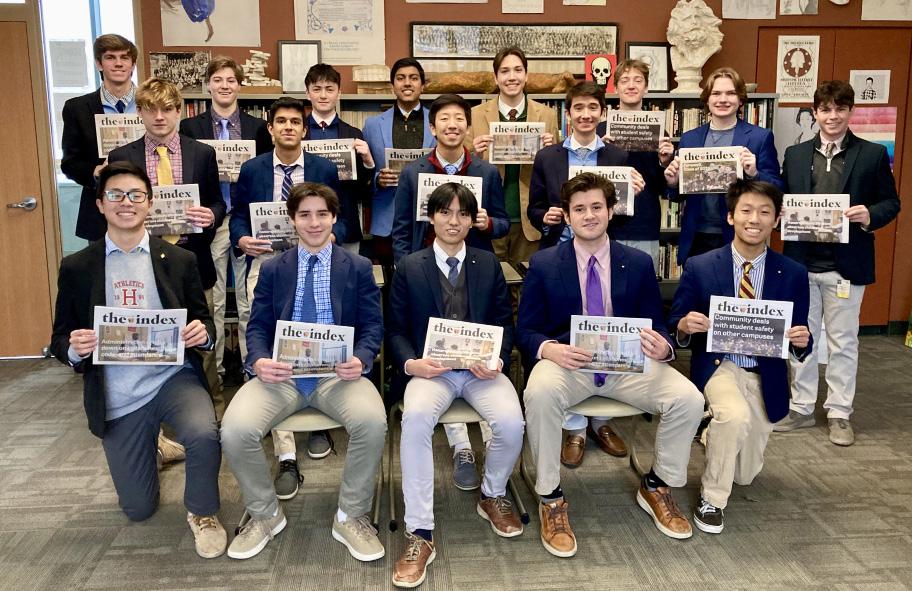 Ford ’24
Ford ’24
PIERCE LAVERAN
the index · features February 2023 Page 10
Mr. Matt Mastronardi in Centennial Hall
‘24
How does Speech and Debate build success?
When you speak to others, maybe you feel nervous and scared, or maybe you just like to argue? No matter where you are in terms of how well you speak, or how much experience you have, you can always improve your skills.
Among the choices on campus, such as Robotics or Model UN, stands Speech and Debate.
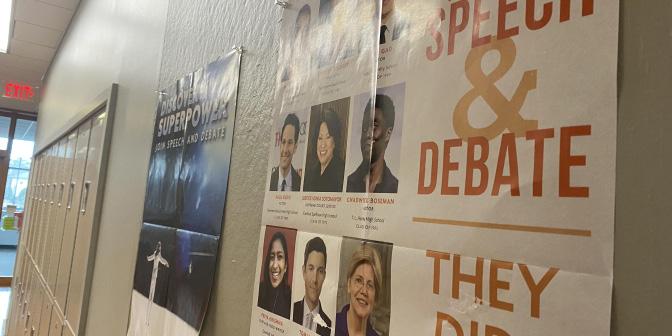
Fourth Former Mason Wiegand, the current undefeated captain, joined the club in First Form. “My history teacher was running it, and I really liked her and she said I
Kelly, Wang take exclusive AIME test
If you are a middle or high school student who enjoys math and problemsolving, then the AMC Math tests may be for you. These exams give you a chance to show your knowledge and provide a challenge that might result in rewards and recognition.
The American Mathematics Competition (AMC) is a highly prestigious and competitive math event for high school students in the United States. The competition is open to all high school students, regardless of their level of mathematical experience. The competition is also offered internationally, attracting students from around the world.
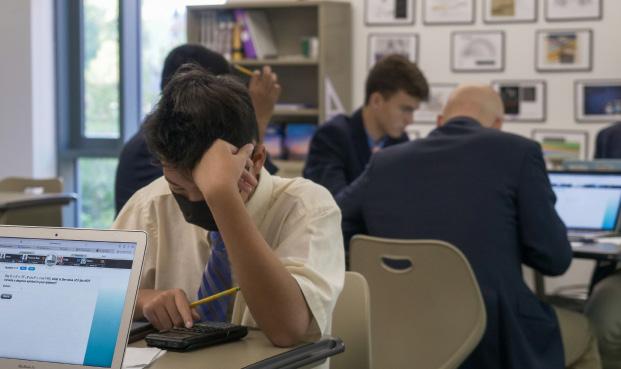
Scoring well on the AMC 10 or AMC 12 can earn competitors an invitation to the American Invitational Mathematics Examination (AIME), a three-hour test. This year, two students, Third Former Jonathan Wang and Sixth Former Colin Kelly, qualified for the AIME.
The AMC provides an opportunity for high school students to challenge themselves and showcase their skills in mathematics. For seasoned math students or those just starting to explore the subject, the AMC allows students to stretch abilities and gain recognition for achievements in the field.
“I find it really exciting to see a problem
would be good at it,” Wiegand said.
Wiegand competes in “extemporaneous speaking,” in which he has “30 minutes to prepare on a topic for a seven-minute speech.”
“These are world event topics that are current,” Wiegand said, “and I have to create an opinion and argue that opinion during the speech.”
“Extemp” speakers must use the skills of improvisation and quick research and thinking that can help in fields that are presentation heavy, such as business or finance.
Fourth Former Luca Aloi joined Speech
and Debate because: “One, it serves as a sports credit, and two, it gives [him] valuable life skills such as public speaking, being social [...], and getting out of your comfort zone.”
Spanish teacher Mr. Javier Lluch and history teacher Mr. LaJuan Foust serve as team coaches. Mr. Foust has been involved with Speech and Debate for around 25 years and started as a high school student.
“I had a classmate who thought I would do really well in the event,” Mr. Foust said. “I didn’t win, but I really enjoyed the experience, so I stayed!”
Speech and Debate’s environment is supportive and enjoyable—the reason Mr. Foust and so many others decided to join its community. It builds bonds.
Mr. Foust said, “My best friends right now are folks I’ve met either as a competitor in high school or college or as a coach.”
The Speech and Debate world is extremely varied but also interconnected. There are many different forms of speech, such as impromptu and extemporaneous, which help students make and think of speeches on the spot, building their confidence and improvisational skills. These competitions usually concern current events and well-known topics.
Mr. Foust mentioned that one year, as a judge for a tournament, he “threw in all random quotes from Star Trek: The Next Generation .”
While many types of speeches in the sport are prepared beforehand, the types that force students to learn about a new topic quickly and deliver a well-informed speech on it are beneficial not only to the basic skills of speaking, but also to expose students to new topics they may not have explored.
Taking risks, building confidence, and learning about new topics and current issues are skills that all students can learn.
This rigorous but manageable schedule sets Speech and Debate students apart from other activities.
Aloi said, “[The team] practices every Thursday and occasional tournaments on Thursdays as well and sometimes have tournaments on weekends, such as the Pennsbury tournament on the weekend of February 4.”
that I don’t know, work through it and use all my knowledge to find a solution,” Kelly said.
“It gives a great feeling of accomplishment.”
For students taking the 2012 AMC 10 (for students up to Fourth Form) the top 2.5% of all scorers or scorers with at least
120 points (whichever is more inclusive), continue to the AIME. For students taking the 2012 AMC 12 (for students up to Sixth Form), the top 5% of all scorers or scorers with at least 100 points continue to the AIME. Qualifying also comes with a feeling of accomplishment. “This year, when I finally did qualify, it was like a rush of relief and also just pride,” Kelly said.
In addition to the competition, the AMC also offers a variety of resources and programs designed to encourage students to pursue their interests in mathematics. These include online study materials, workshops,
and mentorship programs.
Mr. Jeremy Fus, a math teacher and advisor of the Archimedes Association (Math Club) said, “Practice! Frequent, intentional practice really helps students. Finding a community, whether that is the Archimedes Association, an outside group, or an online forum, is usually more fun and helpful!”
Both Wang and Kelly are excited about the competition and are glad that their hard work paid off. The AIME took place this past Tuesday, February 7.
Kelly said, “Personally, for the AIME, I want to just go and enjoy it.”
JINGYUAN CHEN ’23
Speech and Debate posters outside of the team’s practice classroom
Milan Varma ’25
Students work on problems in an Archimedes Association meeting, earlier this year PIERCE LAVERAN ’24
academics the index · academics February 2023 Page 11
Ryan Hu ’26
“[Solving problems] gives a great feeling of accomplishment.”
COLIN KELLY ’23
Ali Islam comes into focus
Whenever people needed an artist, they looked to Sixth Former Ali Islam.
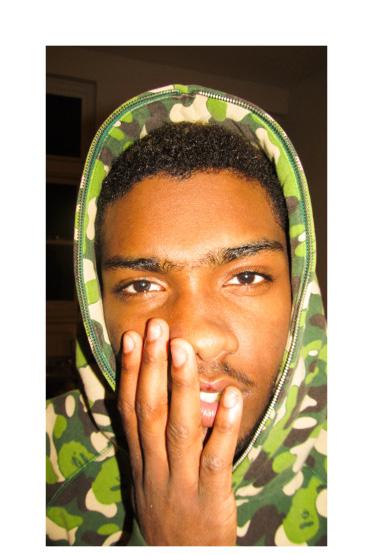
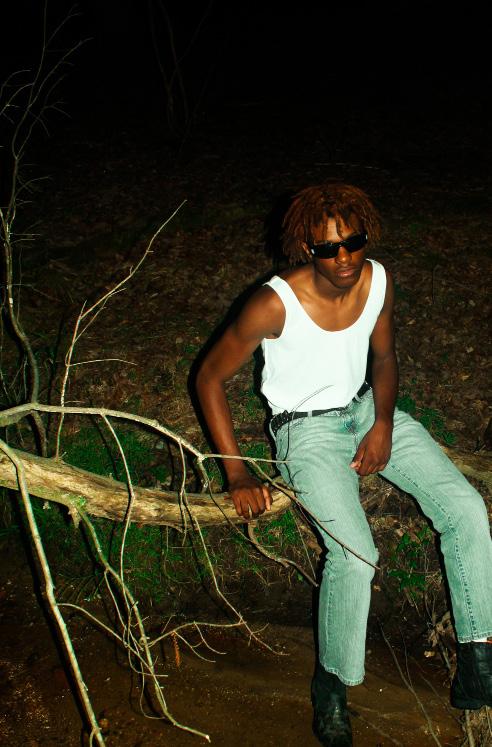
“Ever since I can remember, people looked at me when something needed to be drawn in class,” Islam said. “If a teacher brings up like, ‘This is a drawing aspect,’ now everybody wants to be in my group.”
Islam’s been making art for as long as he can remember, drawing incessantly, making comic books, and, for most of high school, focusing on photography.
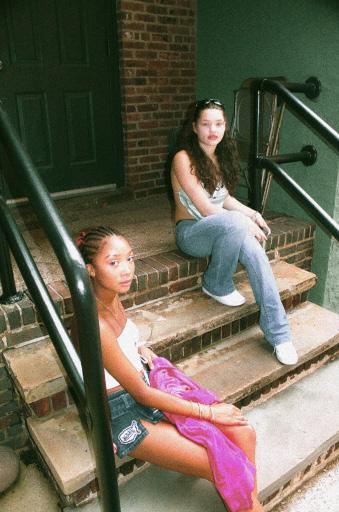
had a sketch on it,” Islam said.
Islam first became interested in photography after seeing his sister’s photographic work.
“I thought [her work] was impossible to grasp and very far ahead of me,” Islam said.
Around December of his Fourth Form year, he started taking pictures with his friends. He found that photography was almost infinitely interesting to him.
“I feel like photography, you can’t really get bored of it because you take thousands of pictures in these photoshoots,” Islam said. “I can also put my image to life on paper, but I feel like I’m better at doing it with a camera.”
Islam became fully captivated by the art of photography after doing his first photo shoot over the summer before his junior year.
“It was the first thing I did, first artistic photo shoot that I did, and it kind of made me realize I could do a lot more with it since I had the camera. Since then I’ve done photoshoots and whatnot, some I’ve submitted to Pegasus,” Islam said.
“I realized that I was good at [art] at a young age, so I just kept doing it because I like doing things that I’m good at,” Islam said.
Although Islam says the comic books he made growing up were about “dumb stuff” like people going to the moon and fighting other people, the effort he put into them turned him into an artist.
“I used to draw all the time. Teachers used to get mad at me for not paying attention in class and just sketching some dumb stuff. It would be a thing where teachers would know my paper if I didn’t write my name because I
The photoshoots are all about taking an idea of Islam’s and turning that into a physical, photographable reality.
“I just have an idea in my mind, and I try to express that through the photos,” Islam
Joey Kauffman ’23
A photo from the collection “Jam packed vol.2,” published July 9, 2022 ALI ISLAM ’23
18,
ALI ISLAM ’23 A
the
“personal” published January 13, 2023 ALI ISLAM ’23
A photo from the collection “echo,” published July
2022
photo from
collection
“I realized that I was good at [art] at a young age, so I just kept doing it because I like doing things that I’m good at.”
ALI ISLAM ’23
“I just have an idea in my mind, and I try to express that through the photos.”
Page 12 & 13 the index
ALI ISLAM ’23
said. “And I get whatever props, whatever location I need for it, and then I try to set it up when I’m free.”
said.
In a world that has its fair share of pretentious art, Islam’s photography captures the energy of young people in a sincere way.
Above all, Islam’s photographs look cool.
“I just want to make something that I think looks cool. Most of the time, it’s nothing more than that. Sometimes I try to branch out and have a theme based on the photos. With some of my favorite photos, there’s a message behind it. But a lot of times I just take photos because I think they look good,” Islam said.
While Islam used to fill his free moments by drawing, he now takes photos whenever he can.
“It’s like I bring [my camera] around everywhere. I have it in my bookbag now. I can just quickly take it out and then take a photo of something that’s in a really good quality that I can edit.”
Islam posts his photos on Instagram under the username @khxbeer, and he has used Instagram to widen his scope.
Beginning this school year, Islam has started taking photos of people other than his friends. He has reached out to models from around the area to collaborate.
He likes doing this because of “one: exposure, because some of [the models] are a little known in a different audience, and two: especially getting other creatives, you can get a new perspective.”
Islam likes doing photoshoots, as they allow him to sculpt the entire atmosphere of a photo.
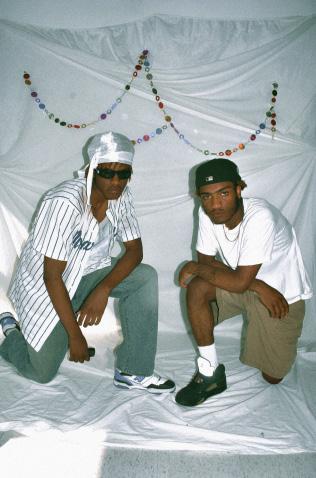
“[Taking photos of people] makes me more proud of what I did because I set it up that way, not just saw a beautiful landscape and took a picture in a really nice camera and it turned out to be a really nice photo,” Islam
In one photo, Islam holds a ribbon stretching from the lens of the camera to the model. Little things like that can elevate the photos to a whole new level.
“It’s just little stuff like that significantly changes the photo shoot.”


Islam plans to minor in photography in college so he can learn more about the mechanics of photography—the cameras, the lenses, the angles, etc.
While he hasn’t taken a photography class at school, he has been nurtured by the art department here.
“Mr. Fox has definitely helped me with my creative direction at times,” Islam said. “I would come to him and present him with what I’m doing, and he would give his advice and whatnot and that was very helpful.”
February 2023 index · arts A photo from the collection “Jam packed vol.2,” published July 19, 2022 ALI ISLAM ’23 A photo from the collection “Jam packed vol.2,” published July 19, 2022 ALI ISLAM ’23
ALI ISLAM
A photo from the collection “Jam packed,” published July 9, 2022
’23
“I just want to make something that I think looks cool. Most of the time, it’s nothing more than that.”
ALI ISLAM ’23
“Mr. Fox has definitely helped me with my creative direction at times.”
ALI ISLAM ’23
Mock Trial prepares for MontCo challenge
Talan Maury ’26
Mock Trial has been in full swing since October 2022, when the cases were released by the Pennsylvania Bar Association. Practicing attorneys came to the school to help the team prepare for their tournament.
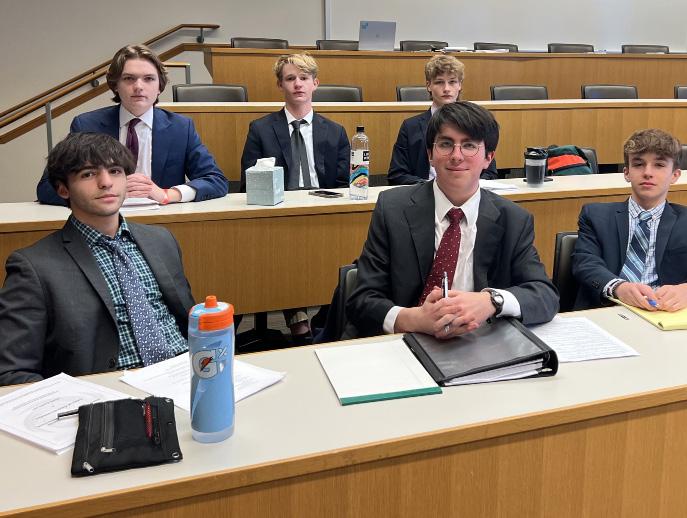
“Usually we do a boot camp where our lawyers come in, and we talk about everything from courtroom etiquette to the rules of evidence, objections, and the procedures within a courtroom,” faculty advisor Mr. Benjamin White said.
After learning about the trial process, the team received their first case in November.
“We get the case and we read through all the facts and jury instructions to get an idea of what we have to prove or disprove, then we read the affidavits, which are testimonies,” Mr. White said. “There are six witnesses: three for each side. We have to comb through those affidavits looking for things that either help or hurt our case on both sides, so we put those things into two buckets, things that help or hurt, and we use those facts to support our case theory: who’s guilty or at fault or not.”
jobs they each had to perform. They put this to the test during scrimmages with other schools in the area.
“In January we do some scrimmages,” Mr. White said. “This year, we scrimmaged EA and Penn Charter, so kids got a chance to truly try out their cases and get a taste for what other schools were bringing to the competition, and what ideas they had because you need to respond in a live situation to what other teams are saying and what their argument is.”
The Mock Trial team then headed to the University of Pennsylvania in West Philadelphia for the Ben Franklins.
Fourth Former Connor Hanney said, “Leading up to districts we had an invitational down at Penn that helped us prepare, do a dry run, see what we need to improve on, see what was good, and see what other teams were throwing at us and how we reacted.”
At Penn, the team got their first taste of what an actual trial consisted of.
“It’s a great learning experience, and real lawyers get to come talk to you about what you’re learning, and we have actual cases that we’re going to argue in actual courts before actual judges, and people who are also lawyers,” Fourth Former Nicholas Lu said.
The team eyes its next steps.
Mr. White said, “We’re in the district tournament which is the end game where we go up against schools in Montgomery County and try to get to the state tournament after that.”
“Case theory involves technical things like what laws apply, but also how to form your argument based on facts, so we look at old cases from past years, and we look at the beginning materials of the case which includes stipulations, the facts of the case, the summary, and the jury instructions which ask the jury to consider the counts against the defendant,” Mr. White said. “The cases are either criminal or civil, so they involve things from negligence, which is this year’s case, to things like murder.”
The team began to get a grasp on the
How do graduation projects get approved?
As the end of the school year approaches, Sixth Formers begin to disappear from Wilson Hall classrooms to complete their last require-
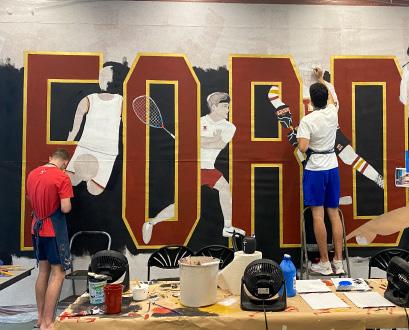
ment: graduation projects.
Every year, they undergo an extensive application process to leave school for the last three weeks of their high school ca-
reers. Projects can take almost any shape or form—maybe a student wants to get a head start on their prospective career; perhaps they take on an internship at a company.
Other examples include service projects or creative projects, such as taking a course on becoming an Emergency Medical Technician or becoming a volunteer firefighter.
Right before winter break, Sixth Formers submitted their first proposals to a committee of teachers. These proposals are just ideas—details are malleable and nothing is confirmed. The committee, after discussing, assigned each idea to one of three categories: green, yellow, and red. Sixth Form
Deam Mr. Tim Lengel leads the committee.
“Green projects have conditional approval, meaning that this looks like it will probably be approved, so lock down details about who’s supervising you, or how long you will be working, or that kind of thing,” Mr. Timothy Lengel said.
“Yellow needs revision. It could be good, but we need more details,” Mr. Lengel said. “Red, or denied, means that it’s simply not a graduation project.”
More often than not, projects get “red” because they do not take enough time to complete.
After their first proposal, students have around a month to submit their final application, which is due later in February.
According to Mr. Lengel, the best projects are ones that speak to the student.
By Spring Break, everyone knows what they are doing. And by May 12, Sixth Formers take their last day of class before leaving to work on their projects until June 6, before Commencement on June 9.
The Mock Trial Team 1 at Penn, January 21, 2023
Elliot Lee ’25
Fisher Bond ’22 and Peter Kaplan ’22 work on spring sports’ mural in the Community Room
“It’s a great learning experiance.”
ZACH FUSCALDO ’25 PIERCE LAVERAN ‘24 the index · academics February 2023 Page 14
NICHOLAS
LU ’25
DVTA promotes wellness for a few Fords
One of the many things that makes the school community unique is the shared sense of belonging that it fosters within the campus and throughout the neighborhood. But how does the community unite its members to achieve this camaraderie? A large part of the answer to this question lies in the organizations and activities that students participate in.
A number of students within the community play tennis. One of the main places of recreation for this sport is the Delaware Valley Tennis Academy, about a six-minute drive down Lancaster Avenue from school. DVTA, abbreviated for Delaware Valley Tennis Academy, has established itself in the Bryn Mawr area. DVTA has an array of welltrained and experienced coaches who work with players, prioritizing their goals to give personalized training.
One of these coaches, Bill Fleegler, has been an instructor at DVTA for around eighteen years. He is the junior tennis direc-
tor and the head of staffing.
“Tennis is a lifetime sport. We teach people anywhere from four to eighty years of age,” Fleegler said, “and tennis is such a fun, healthy sport to play.”
People who have been involved in the sport of tennis can attest to this fact, that it is an extremely fun and healthy sport to get into, and one that can last a lifetime.
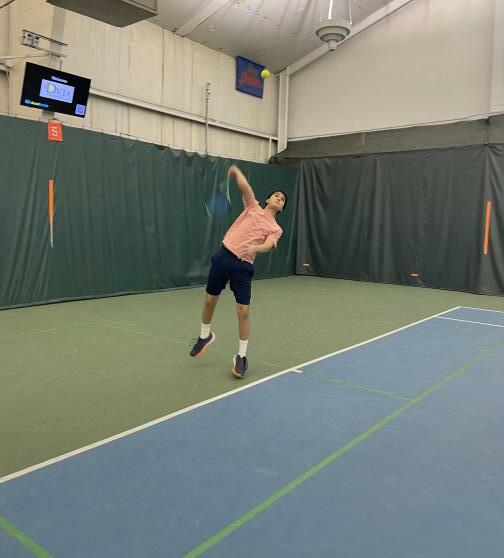
Ajay Chakraborty, Third Former and a long-time tennis player at DVTA, joined DVTA “first about five years ago. [...] My brother Nick was looking for a tennis academy to play at, and he played pretty competitively, so he joined DVTA. He started taking lessons with a coach that used to be there, his name is Jack Conrad. I started by taking
lessons with him too.”
Chakraborty said, “I went there for about a year or so, until about fifth grade, but I stopped there because I had way too much stuff on my plate, and then, recently,
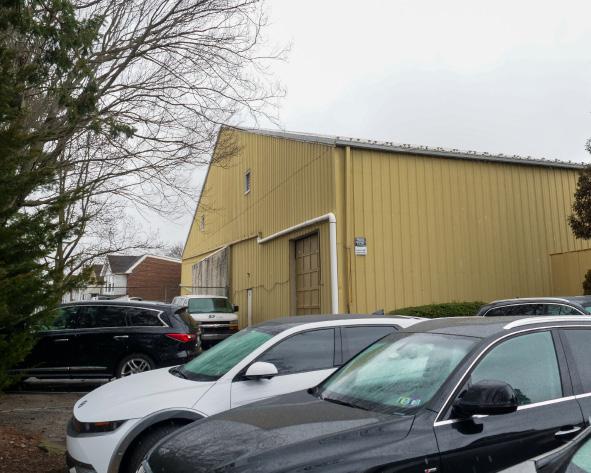
around November, I started again.”
As Fleegler mentioned, tennis is a sport that players never lose, and for Ajay, holding on to his love of this sport was definitely due
to DVTA’s environment.
Athletics in general promote good health and hard work and are especially helpful to high school students by creating bonds between teammates, keeping them fit and healthy, and teaching skills such as improvement and getting over losses.
PIERCE LAVERAN ’24
Milan Varma ’25
FIRST LAST ’2#
Conestoga High School on October 30, 2020
With its unassuming outside, DVTA’s building contains a lively athletic community
“Tennis is a lifetime sport. We teach people anywhere from four to eighty years of age, and tennis is such a fun, healthy sport to play.”
neighborhood the index · neighborhood February 2023 Page 15
BILL FLEEGLER
DVTA member Ajay Chakraborty ’26 strikes a tennis ball at The Villanova University Tennis Complex
COURTESY OF CHRISTOPHER SCHWARTING ‘24
“Athletics in general promote good health and hard work and are especially helpful to high school students by creating bonds between teammates, keeping them fit and healthy, and teaching skills such as improvement and getting over losses.”
around the corner February 10 17 Varsity Basketball Game against the Episcopal Academy; Varsity Winter Track Meet Start of Presidents’ Weekend - No Classes
BILL FLEEGLER
on-campus opinions
High school is a time for selfdiscovery, where students learn about themselves and build healthy habits and relationships. For some, it may also be a time when they discover their passions and find so much interest in a particular topic they decide to devote their career to it.
But, in recent years, this period of exploration has taken on unwelcomed pressure: the pressure to stand out. With colleges looking for rounded students with unique talents, skills, and experiences, students are feeling the need to go above and beyond to cater to the eyes of admissions officers. As students attending one of the top-twenty boys schools in the country, this pressure is further amplified by the need to keep a reputation.
So how do students distinguish themselves in such a competitive environment?
Some students resort to overcommitting to various school activities, whether that be taking on several sports or simply joining and leading several clubs. This solution often results in the inability to manage a large workload, creating a stressful environment.
Another way for students to stand out is to start a venture, either entrepreneurial or, more commonly, charitable in nature. While starting any venture from scratch comes with large risks, starting in high school minimizes them.
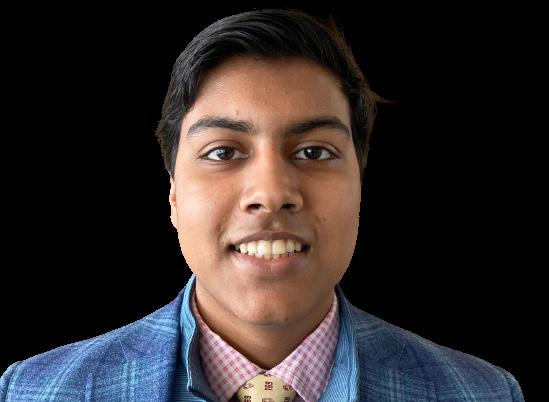
The majority of students in our community who would want to start a business have access to the resources required to do so, and when the scale is so small, there isn’t enough downside to make someone shy away from just trying. If a business in high school fails, it’s only you and potentially a circle of friends and family that take any psychological or monetary loss.
However, when students decide to start a charity/nonprofit, their playing field is much different. A few considerations go into starting a nonprofit in high school. First is the thought that starting a nonprofit organization will look good on college applications. Blinded by this, what many students fail to realize is how hard starting a nonprofit is.
“For the first six months, it was quite difficult to get started. I spent my entire spring break making the website, reaching out to other businesses regarding the Food4Philly business model which runs off surplus food donations, while dealing with internal conflicts within my team,” Sixth Former and Food4Philly CEO Ethan Chan said. “At this point, [Food4Philly is] growing exponentially, but it wasn’t always like this, so it is important for people to recognize that you have to be 110% committed for the long haul and be willing to put yourself out there and challenge yourself.”
In the real world, nonprofits are businesses with CEO-type people with their Masters in Business Administration running them. Even with these extremely qualified professionals running them, nonprofits fail all the time. Even in the college sphere, nonprofits can end up short of their goals, sometimes failing completely. Realistically, if people with real-world business skills struggle to make successful nonprofits, a high school student doesn’t stand much of a chance.
“Anyone can technically form a non-profit, but not everyone can truly make a difference,” Chan said. “It really comes to how much you care. While I don’t like to assume, recently, I’ve seen an increase in non-profit organizations being created, with no mission statement and maybe one project, before being disbanded altogether.”
College admissions is not a zero-sum game. It would work if you were the only
student on the planet to include a non-profit with your application; the boldness of such an undertaking alone would be sufficient. However, this “method” started to become popular over a decade ago, and now countless numbers of kids engage with it.
Following the crowd will not make an application stand out. It makes the application similar to other ten-thousand teens taking part in the same game. And, unless you’re that shoe salesman who has donated fifteenhundred pairs of shoes to underprivileged communities and made $500,000 in sales, your nonprofit won’t necessarily stand out.
amount of people. When someone creates a nonprofit, they make a commitment to serve the underprivileged. When they fail, they not only fail themselves but all those whom they had promised to help.
There are ways to stand out while volunteering. Creating your own impact on a larger, preestablished organization is arguably as impressive as starting a successful nonprofit in high school.
Hypothetically, if you start volunteering/ working for a charity organization as an athlete of any kind, and find a way to leverage your athletic network to raise funds, food, or resources, you show initiative and a genuine interest in what you do. Additionally, this connection between two seemingly different parts of yourself shows synergy in your application and how you have the ability to use your passions to do good.
The pressure to stand out in high school drives students to explore new ways to make their impact on the world. On the other hand, it can lead students to engage in activities that are not truly representative of their interests and values.
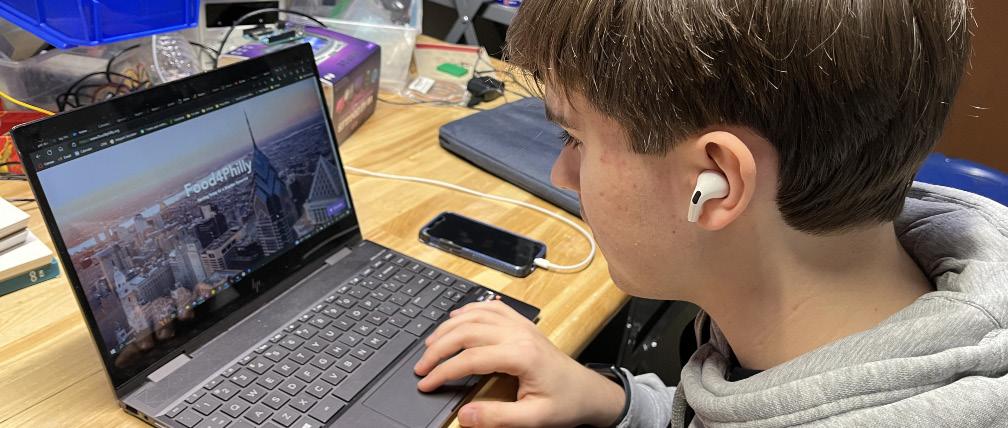
But, thinking every student who starts a nonprofit is doing it just for their applications is unfair. Many students genuinely care about a problem in the community and want to help people. Helping people is great. But, the best way to help people is by volunteering, not by trying to run a business. The time spent managing, planning, and carrying out a full-fledged nonprofit organization could be more productively spent devoting hours at a local food pantry to help the food insecure.
Although the intention may be there when starting a nonprofit, they largely end up failing or not doing as much as planned. Countless hours go into running an organization, so when it fails that time is lost when it could have been used to volunteer at an established charity and help a quantifiable
Instead of trying to impress admissions officers, students should focus on ways to serve their communities and make a genuine impact.
Charity isn’t a stepping stone into college; it’s a way to help others and make a difference in the world.
ETHAN CHAN
Ronan Wood ’23 scrolls through Haverford student founded non-profit Food4Philly
’23
Arsh Aggarwal ‘24
“It is important for people to recognize that you have to be 110% committed for the long haul and be willing to put yourself out there and challenge yourself.”
ETHAN CHAN ’23
the index · on-campus opinions February 2023 Page 16
The time spent managing, planning, and carrying out a fullfledged nonprofit organization could be more productively spent devoting hours at a local food pantry to help the food insecure.
Instead of trying to impress admissions officers, students should focus on ways to serve their communities and make a genuine impact.
The Pressure to Stand Out: How high school expectations threaten the true purpose of altruism
Have you ever wanted to be hypnotized? What if the outcome was that you would suddenly learn how to create beautiful works of ceramics on the pottery wheel? It sounds oddly enticing, and it’s possible through upper school ceramics teacher Mr. Jacob Raeder’s recent collaboration with filmmaker HsinYu Chen.
ChatGPT is a groundbreaking new language model developed by OpenAI. It specializes in conversational dialogue and has the ability to automatically generate humanlike text from a user’s prompt. This can include functioning computer code, text summarizations, and essays with research about any topic. Because OpenAI has released a
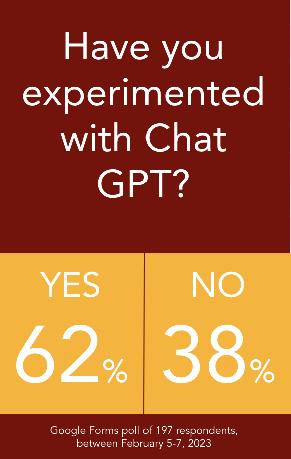
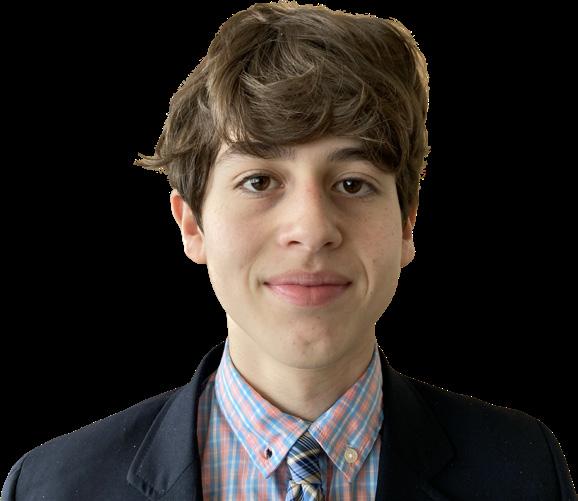
ChatGPT: A calculator for English class
public research demo for free, any student can access this powerful tool with simply an internet connection and a functioning web browser.
In light of ChatGPT’s growing popularity, many teachers have been worried about the potential for students to cheat on homework and essays by automatically generating multiple-page responses to a single prompt. In my opinion, teachers have no need to worry because the text generated by the chatbot is not quite on par with the work done by students. While the bot is able to sound like a human and do research to make supported claims, it often fails to understand the true meaning of what the text is trying to accomplish.
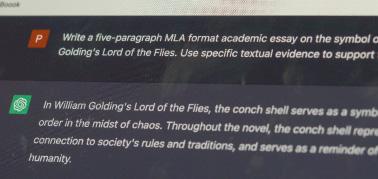
To test this hypothesis, I asked ChatGPT to generate an introductory paragraph to this very article. I asked it to provide a brief description of what ChatGPT is, how it func-
tioned, and how teachers were worried about the potential of students cheating. While it did generate a paragraph that included all of those things, the paragraph failed to hook the reader’s attention or present the information in a meaningful way.
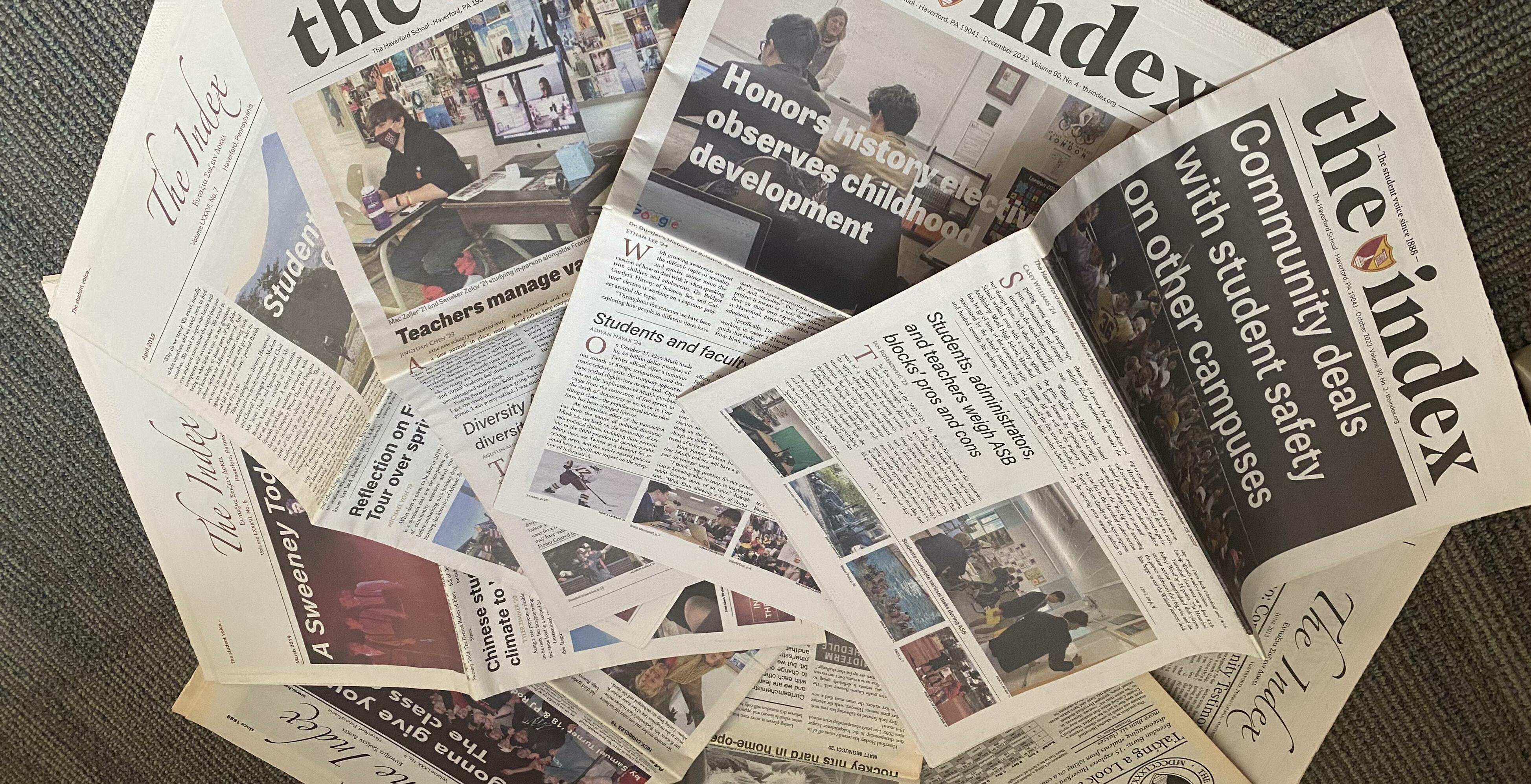
The power of ChatGPT lies in its ability to create frameworks and provide evidence for students when they are starting a new essay. Often, the hardest part of writing for students is deciding what to write about or how to structure the paper. Once this important step is accomplished, students are usually able to easily find evidence to back up their claims and actually write the essay itself.
By entering their essay prompt, students can ask ChatGPT to generate a simple essay outline for their paper and provide some basic research/background information to get them started. Then, they can improve upon
ChatGPT’s basic outline to write the full paper without the long process of deciding on what to write about.
Another helpful use of ChatGPT is its ability to evaluate and compare different pieces of writing. Using this feature, students can easily compare their essays to any examples the teacher provides or even the rubric itself. This will allow students to see where their essays may be lacking information or where they may lose points on an assignment. As long as they don’t ask the bot to actually rewrite the essay, I do not think this is cheating because the AI is merely giving suggestions and making comparisons, which is the same process as a peer review with a real human.
Just like the invention of the calculator, this new technology will hopefully become an aid for students rather than a hindrance for educators.
the index · on-campus opinions February 2023 Page 17
ChatGPT produced this response about Lord of the Flies
Different issues of The Index over the years INDEX STAFF
PIERCE LAVERAN ‘24
Tommy Saul ‘25
off campus opinions
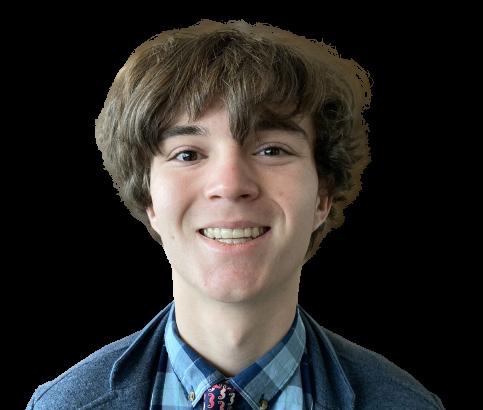
George Santos: elected, but at what cost?
George Santos, one of the first openly gay Republican representatives, might be the most interesting person to ever grace the American political system.
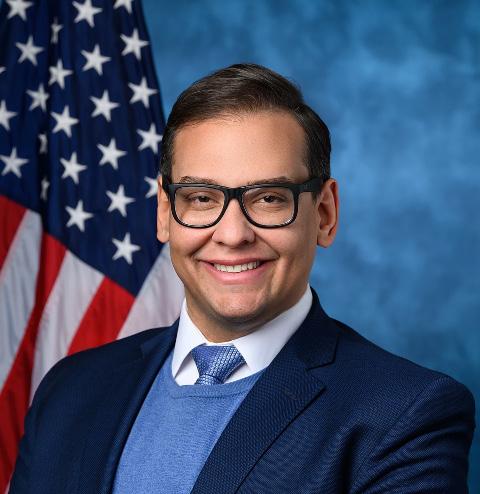
It is shocking that someone with such an unusual background would ever think to run for a representative position, throwing him into the public limelight.
According to Santos, his mother was deeply affected by the 9/11 attacks, stating that she was in her office when they happened, and the main reason why he was running was because he wanted to give back. When Santos was elected, it seemed as though he was an extremely intelligent individual. He stated that he graduated from Baruch College, and earned an MBA from NYU, eventually working for the prestigious investment banking company Goldman Sachs. Santos also claimed to be a man of the people, starting a foundation that saved 2,500 dogs and cats from 2013 to 2018.
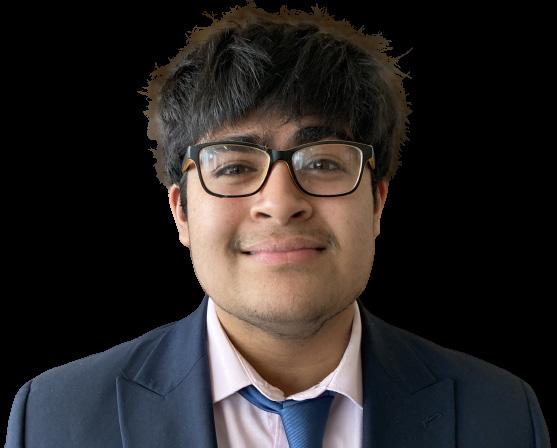
Well, every single thing in the previous paragraph was a lie. Santos never went to college, never started a foundation, never worked for Goldman Sachs, and his mother was living in Brazil when the 9/11 attacks happened. Lying about where you go to school is one of the stupidest things you could do, because all schools keep records of every student to pass through them. Why
Just days before the 2022 Qatar World Cup, Ronaldo’s contract with Premier league team Manchester United was terminated. After appearing in an interview with Piers Morgan on November 16 slandering his club, Ronaldo breached his contract with Manchester United. He accused his employers of betrayal and heavily disrespected the head coaches.
“Not only by the coach (Erik ten Hag), but also by two or three other people around the club, I feel betrayed,” Ronaldo complained. “Some people, I feel, don’t want me here.”
would someone who lives a lie, and has virtually no qualifications want to run for Congress?
Representative Santos could possibly be the world’s biggest narcissist. It is one thing to lie, and then it is another to believe your own lie, even when it has been disproven multiple times. Transparency is a given when becoming a politician, and it is just mind blowing that someone who lied so much would be willing to get “found out” so easily. This speaks volumes about the political system: why aren’t background checks taken seriously? How can people gain influence so quickly?
Personally, my favorite George Santos moment was when he lied about his religion, stating that he was Jewish on multiple occasions. He later stated that he was Catholic, not Jewish but “jew-ish.”
We can look back on his election in horror, but in reality, who is having the last laugh? Santos was able to successfully dupe the entirety of his New York district. Lying, cheating and scamming are all easy ways to get to the top, but now he has lost all his credibility, respect, and honor. Honor and character are two things that cannot be restored once broken.
Let’s all take a page out of Santos’s book, and don’t embellish your resume!
While it may seem like Ronaldo had been mistreated by his own team, that is simply the way any sort of constructive criticism would sound to a primadonna football player.
There is no doubt that Cristiano Ronaldo is one of the world’s best football players. Hailing from Portugal and appearing in 196 international games representing his country, Ronaldo has played in five World Cups and is Europe’s most capped player. Ronaldo
holds the world record for goals scored.
The question is, if Ronaldo was one of Manchester United’s Most Valuable Players, then why did he switch teams, and why was everyone on Man U supposedly praying on Ronaldo’s downfall? Well, with the type of publicity, fame, and money someone like Ronaldo gets, an ego, and the belief that everything is supposed to be about you, is sure to follow. His Manchester United teammates reported on his overall toxic behavior, which put pressure on the team to finally drop him.
After Ronaldo’s interview, Manchester finally had a legal reason to remove him from their roster and send him off. He had received many offers from all over the world: Australia, Brazil, and his home country, Portugal. Obviously, he didn’t take any of them because none of them paid as much as the oil money from Saudi Arabian sheiks.
On January 1, 2023, Cristiano Ronaldo signed a two-and-a-half-year contract with Saudi Arabian football club Al-Nassr.
After a disappointing World Cup performance, Ronaldo had to sit and watch the world’s most liked player, Lionel Messi, have an incredible tournament and win the
Golden Ball, in addition to the World Cup itself. As for Ronaldo, Portugal’s elimination in the quarter finals prevented him from ever winning the World Cup and completing his football goal.
Shouldn’t Ronaldo being on Al-Nassr be a good thing? being on Al-Nassr be a good thing?
The time spent in Qatar during the world cup most likely influenced Ronaldo’s decision to sign with a Saudi team. However, since signing with the team, Ronaldo has not been performing well, and the team recently lost the Saudi Super Cup 3-1 against Al Ittihad. After this upsetting defeat, a video of the Al Nassr coach throwing a fit went viral. “I spent 200 million euros, and he only knows how to say, ‘Siuu,’” he yelled.
Additionally, videos of fans stomping on his number 7 jersey have sprung up, and his fanbase is slowly turning on him.
Shouldn’t Ronaldo being on Al Nassr be a good thing? After all, he is one of the world’s best players. Well, Saudi Arabia isn’t exactly known for its soccer, and what it is known for is not very pretty: human rights abuses and oil. Saudi Arabia uses sports to whitewash its name and reputation. They host golf tournaments, chess championships, tennis tournaments, and for the next ten years Formula One will host their championship in the country. With the purchase of Ronaldo, Saudi Arabia draws the world’s eye to its soccer teams, not the country itself.
Sportswashing is defined as an attempt to distract from, minimize, or normalize wrongdoing through engagement in sport. Sportswashing isn’t just local to Saudi Arabia or Qatar’s 2022 World Cup; it occurred recently in 2018 when Russia hosted the 2018 World Cup while Putin was under scrutiny for being a dictator and controlling the country’s election.
Ronaldo’s deal with Al Nassr will not be his final deal. He aims to eventually go back to Europe and end his hiatus in the Middle East. As for now, Ronaldo can only play soccer and wait out his contract.
NY Representative George Santos poses for official house portrait Ronaldo signing with AlNassr is sportswashing
US HOUSE OFFICE OF PHOTOGRAPHY VIA WIKIMEDIA COMMONS
Abdullah Kanchwala ’25
Liam French ’25
the index · off-campus opinions February 2023 Page 18
While it may seem like Ronaldo had been mistreated by his own team, that is simply the way any sort of constructive criticism would sound to a primadonna football player.
It is disturbing that a simple social media service where the majority of its users are young teenagers has recently been deemed by professionals as deadly.
TikTok is a social media application owned by the Chinese company ByteDance. It hosts short-form, user-submitted videos ranging from a duration of fifteen seconds to ten minutes. Much like many other social networking platforms, the videos are either presented on a “friends” section, displaying videos uploaded by “TikTokers” whom one is friends with, or a “for you page (commonly referred to as an “FYP”),” which features personalized, interest-based videos selected by a complex data algorithm. But there is no way this can be “frightening” or “dangerous,” though, right? Wrong!
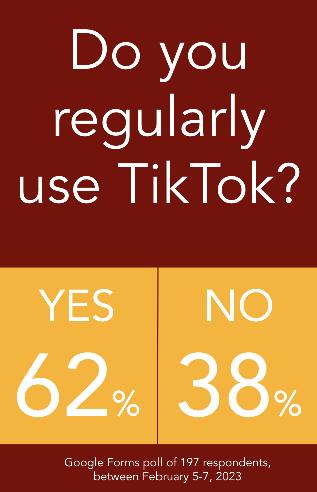
U.S. professionals have warned the nation that the Chinese government may possibly be demanding ByteDance to share their TikTok users’ data and information with them. At least 24 of the states in the U.S. have already banned the application on state owned devices for this very reason, and many
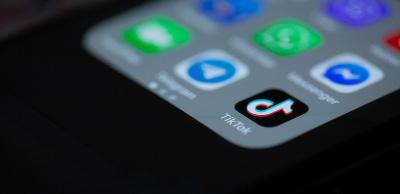
“TikTok,” please take our private information
more are to come in the near future. This is a primary reason why it is essential to be vigilant if you are using TikTok or another similar social media platform.
you, the better it is for its algorithm.”
The average high school student, however, does not care about these data breaches: one might say, “If they don’t have my credit card information, then why does this situation even matter? The Chinese government doesn’t need to know anything about me!” Although that might be the case, many students are oblivious to privacy laws.
Technological privacy is incredibly important because it is a right that supports alternative rights and autonomy. It supports the freedom of speech along with the freedom to assemble, and most notably, the freedom to exercise your liberties when you do not expect to be monitored. This essentially represents the basic right to privacy, or to be left alone.
William “Will” Marks is a technology policy researcher and an affiliate at Harvard University’s Berkman Klein Center for Internet and Society. When I asked him about the true danger of social media platforms like TikTok, he explained, “Targeted information can influence the way that you think. That is the danger of the ‘for you page.’ Likewise, it can be dangerous when someone else chooses what you are watching. They can push information across to your screen, which oftentimes makes you feel a certain way: it might force you to choose a political side, it might make you angry, or even worse, depressed. The more the app knows about
TikTok and other platforms’ artificial intelligence learns from likes, dislikes, comments, and posts. It dictates what you are watching, not only based on your interests, but also by what they want you to see, sometimes resulting in anxiety, and unfortunately, even suicide.
Other governments around the world (much like the Chinese government) could potentially blackmail users. Everyone has secrets they want to keep to themselves, and even if what they are hiding is not vastly significant, you generally do not want anyone else—let alone an entirely separate country—obtaining this information since they can use it against you.
Additionally, your breached data may not affect you now, but it can certainly hurt down the line. It is impossible to predict exactly what will be viewed as illicit or inappropriate in the future, so once again, being conscientious of what you are posting, liking, disliking, or commenting and confirming that none of it is personal information is a necessity.
“So how can I ensure that my data and information remains private?” one might ask.

“Deleting the app would be the most complete thing to do moving forward, but it is understandably difficult because there is
a lot of value to being on social media, especially in a high schooler’s social life,” Marks said. “You can increase your media literacy so you are cognizant of what is fake news (along with what you are posting). And finally, we can make sure political agencies regulate these platforms.”
Although it would be wise to stay away from TikTok in particular, I am not saying all social media platforms are bad—just be careful and make good decisions when using them, because if you do not; tick-tock, there goes your private information.

SOLEN FEYISSA VIA WIKIMEDIA COM-
Tommy Saul ’25
The average high school student, however, does not care about these data breaches.
the index · off campus opinions February 2023 Page 19
TikTok app open on iPhone as concerns arise over personal data breaches
Everyone has secrets they want to keep to themselves, and even if what they are hiding is not vastly significant, you generally do not want anyone else... obtaining this information.
I am not saying all social media platforms are bad—just be careful and make good decisions when using them.
Will AI art replace human art?
As modern technology grows increasingly complex, artificial intelligence has grown right alongside it, particularly in how it mimics human behaviors. With just a few words in a prompt, artificial intelligence can create human-like digital art. But considering that it’s made by a computer, some wonder if it’s even art.
While AI-generated art may look like the real deal, many feel there is a certain quality to the art that is missing.
“Yes, amazing images. Yes, sense of space, all the art ‘stuff’ is going on in there,” art teacher Mr. Fox said. “Do I think it’s art? I think it’s missing soul. And I think only humans have that depth of personal meaning or personal interest or their own experience that they bring to making images.”
The AI programs that generate the artwork are designed to use the internet’s vast collection of real art to analyze the shapes, techniques, styles, and moods behind each image. This analysis, known as machine learning, is a common practice in the AI industry. By using machine learning, the program can mimic anything it finds to a certain extent. This is why AI artwork looks the way it does, and why it is able to use real art techniques.
However, since the program generates images based on inferences from data, there is often massive room for error. Depending on the prompt, the program can make different photos in vastly different styles since its range of references is so diverse. If AI is given the same prompt repeatedly, it will create the same image repeatedly.
Since the program is just mimicking the styles and techniques of real artists, what it fails to capture is a unique quality in the message or thoughts behind the art: the soul.
Mr. Fox explains his thoughts through Bob Ross, a popular artist from the early 1990s. In many of Ross’ videos, he draws similar landscapes over and over, and while many agree that his artwork is visually appealing, it isn’t interesting. Mr. Fox followed by saying, “Yes, he cares about what
he does… but he kind of manufactures things. And I think [for] an artist who is less interested in cranking out things and more interested in saying something or investigating something, the artwork is a little more unique and more interesting.”
Fifth Former Michael Wylie has a slightly different take.
“It’s like artificial worth,” Wylie said. For art to be valuable, he thinks it is “something I can look at for, like, a long time and just stare at and find out new things every time I look at it.”
Fifth Former Andrew Bradley thinks the artificiality of AI-generated artwork “takes away from the art.”
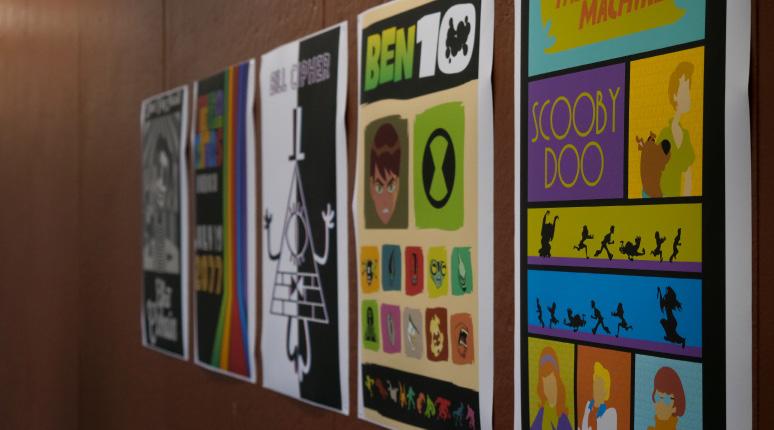
AI artwork is not all bad, however. Even though many AI programs are behind a paywall, the time investment required to get detailed artwork from the program is hundreds of times faster than what a traditional artist would need to create the artwork from scratch. It also enables just about anyone to create artwork without needing actual artistic experience.
In regards to the art industry, Wylie said, “I think it’s going to get weirder… I think there’s going to be a certain kind of people who are willing to buy it, but there’s a
vast majority who are not going to think of it as art because you can just type in that same prompt and get something relatively similar to it.”
it will not count as actual artwork until the artist is done with it.
“Everything kind of moves over on the bench and makes room for the new things,” Mr. Fox said. “But I don’t think humans will ever get bumped off the bench.”
Both parties agree that even as AI technology improves and becomes more detailed and efficient, there will always be an appeal for human-made artwork. Portrait artists did lose much of their audience when the camera was invented, and the same pattern will be reflected as AI art becomes a more popular tool.

“New tools are always exciting,” Mr. Fox said. “But in the end, it’s just a tool.”
Many artists use software like Photoshop in order to save time and effort during a piece, but the majority of the artwork is done by the actual artist. AI artwork can be used as a base for inspiration, but even then
New Puss in Boots movie is actually quite good
After ten years since the last Puss in Boots movie and twelve years since the last Shrek movie, Puss in Boots is finally back in a brand new movie: Puss in Boots: The Last Wish
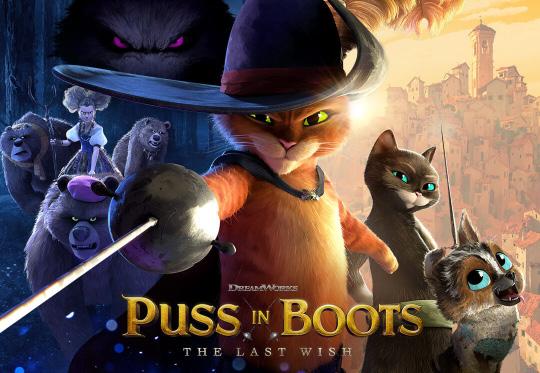
The movie opened on December 21, 2022, and reached an impressive box office of over $334 million worldwide. The movie follows Puss in Boots (voiced by Antonio Banderas) dying for the eighth time, meaning he only has one life left (since in this story, cats actually have nine lives).
In his last life, he has to retire so he doesn’t die forever, so he goes to live with dozens of other cats at an old lady’s home. But he then discovers that there is a sacred “Last Wish,” which, once found, can be used to grant any wish. So, he escapes the home with a small dog who he calls Perrito (voiced by Harvey Guillen) and his sidekick from the first movie, Kitty Softpaws (voiced by Salma Hayek).
The three go on a long journey to discover this “Last Wish” while fighting against Goldilocks and the Three Bears and an evil pastry chef named Jack Horner (voiced by John Mulaney), who all want to reach it first
to get their wishes granted.
The movie scored a 95% Tomatometer on Rotten Tomatoes based on critics’ reviews. The New York Times said that the movie “contains amusing jokes and has an old-fashioned impulse to tug at heartstrings. This despite the video-game-suggestive plot construction, in which Puss and cohorts, aided by an animated map, race to a dark forest to find a wishing star, with other children’s lore characters in hot, malevolent pursuit.”
Along with critical acclaim, the movie also achieved a 94% audience rating based on thousands of ratings.
I was not particularly interested in seeing this movie when it came out. I saw all of the Shrek movies and loved them, but when I saw the first Puss in Boots movie I thought it was just okay. Even for the first few minutes of this new movie, I wasn’t sure how I felt about it, but it quickly turned around.
I thought the plot was actually very interesting, and there were constant twists and changes in scenery to help keep it intriguing. Sometimes this would become a little overwhelming as there seemed to be constant
action with very few breaks, but it overall worked and kept me on the edge of my seat, with new characters and conflict popping in and out constantly.
Puss in Boots’ character is still the same quick-witted and sarcastic cat that he was back in the original Shrek movies, but his more heartfelt side is shown in this movie.
The entire movie was also quite funny. The characters were all really well-written and were able to fit together well, with their individual personalities and senses of humor complementing each other perfectly.
Puss in Boots’ character is still the same quick-witted and sarcastic cat that he was back in the original Shrek movies, but his more heartfelt side is shown in this movie, especially towards the end.
Kitty Softpaws has a similar personality, and she and Puss in Boots are able to grow together into more open characters.
The movie’s new character Perrito is also a great addition, and he is able to make the movie more lighthearted with his wholesome optimism and sense of humor. His connection with the other two characters is also very wholesome and he is able to complete the story really nicely.
Even though it is a kids’ movie, The Last Wish never feels too juvenile or immature and remains enjoyable and hilarious for all audiences.
Russell Yoh ’24
VIA UNIVERSAL PICTURES
Sean Ngo ’24
AI-generated “art” posted outside the upper school office suite
PIERCE LAVERAN ’24
Poster for Puss in Boots: The Last Wish
“New tools are always exciting. But in the end, it’s just a tool.”
arts the index · arts February 2023 Page 20
MR. CHRISTOPHER FOX
The cultural impact of Beyoncé’s Renaissance Album
Liam French
On January 21, 2023, Beyoncé performed for the opening of a luxury hotel in Dubai and was paid 35 million dollars to do so. This was her first concert in over four years, and it was invite-only, featuring journalists, influencers, and celebrities such as Letitia Wright, Winston Duke, Chloe x Halle, and Rebel Wilson.
Beyoncé opened her concert with a cover of Etta James’s “At Last.” She was accompanied by a full orchestra, a dance ensemble, and even a duet with her daughter Blue Ivy on their song “Brown Skin Girl.”
Despite releasing her new album Renaissance in the summer of 2022, her Dubai performance did not feature any songs from the multi-Grammy nominated album. Instead, its setlist consisted of—in order of appearance— “XO,” “Ave Maria,” “Halo,” “Brown Skin Girl,” “Be Alive,” “Bigger,” “Freedom,” “Beautiful Liar,” “I Care,” “Crazy In Love,” “Countdown,” and “Naughty Girl,” to name a few.
While Beyoncé’s concert in Dubai was sensational, it did leave some of her fans upset that she would perform in a country where one of her biggest inspirations... could be sentenced to death for existing.
Beyoncé ended the show dancing in a fountain with an ethereal and powerful rendition of “Drunk in Love” in the Phrygian mode. A video of her final riff went viral after users uploaded footage of her concert to TikTok which had viewers all over the world entranced.
While Beyoncé’s concert in Dubai was sensational, it did leave some of her fans upset that she would perform in a country where one of her biggest inspirations, her Uncle Jonny, to whom she even dedicated Renaissance, could be sentenced to death for existing.
In Dubai, it is illegal to be gay, and is an offense punishable by death due to the Sharia Law derived from the Quran. Beyoncé’s fanbase did express concern about her choice, but then again 35 million is 35 million.
Beyoncé is not a shallow person for this, and she must have been eager to perform for the world after such a long hiatus. In addi-
tion, she has released limited visuals for her recent album, with only “I’m That Girl” and “Break My Soul” receiving teasers. With this lack of visuals, she wants her fans to experience the music for themselves, to draw their own conclusions and associations with the music.
On the other hand, some fans and sources speculate that Beyoncé may be releasing another film in the same way she did for her previous album, Lemonade. Only time will tell, as it has been six months and she has still not released a single music video for the album.
Beyoncé’s Renaissance features a wide range of music: disco, electro-funk, afrobeat, techno, breakbeat, and house, which ballroom culture used as a form of resistance against racism and homophobia during drug pageants for gay black men and transgender women.
Beyoncé’s album Renaissance is grounded in black queer ballroom culture. It debuted at no. 1 on the Billboard 200 and had the third highest album debut of 2022, though it should have been no. 1. Vanilla artists like Harry Styles and Taylor Swift (Who, I love but I will admit is a tad overrated) clogged up the top 10 with their Jack Antonoff-produced mainstream music, not allowing for diversity on the billboard.
Contradictingly, Beyoncé’s Renaissance features a wide range of music: disco, electro-funk, afrobeat, techno, breakbeat, and house, which ballroom culture used as a form of resistance against racism and homophobia during drag pageants for gay black men and transgender women.

Beyoncé samples drag icons of the era such as Kevin Aviance and Moi Renee, and on her lead single “Break My Soul” she samples Big Frieda’s 2014 track “Explode.” DJ Honey Dijon, who worked on the production of Renaissance, is a black trans-activist herself and remixed “Break My Soul” with Beyoncé. The album cover of Renaissance is a shout-out to designer Telfar Clemons and pays homage to Harlem’s ballroom scene.
A remix of “Break My Soul,” The Queens Mix features a reworking of “Vogue”
with powerful black women and queer artists such as Lizzo, Janet Jackson, Aretha Franklin, Grace Jones, Missy Elliott, Diana Ross, and Lauryn Hill.
The song also pays homage to multiple Drag houses—a house of chosen family that one competes with at Drag Balls—in the following verse. This brings the song back full circle to the title of the classic Madonna hit.
By embracing black queer culture, Beyoncé raises awareness for the community that threw the first bricks at Stonewall and is responsible for the majority of queer culture we have today.
Voguing is a dance that is judged in ballroom pageants. Voguing’s roots are in the Harlem Renaissance—a dance form created to rebel against the “traditional” dance that was used to express the flow of movement and sexuality, as well as a way to fight against racism and homophobia.
The reason why the outro of the ``` track “Heated” is so iconic is because it portrays the life, celebration, and queerness of
a drag ball seen in the lyrics “tip, tip, tip on hardwood floors / ten, ten, ten across the
board (with a waist that whines like it) / Give me face, face, face, face, yah / Your face card never declines my God.”
By embracing black queer culture, Beyoncé raises awareness for the community that threw the first bricks at Stonewall and is responsible for the majority of queer culture we have today.
Fourth Former Aaron Bonaparte is a part of the BeyHive, Beyoncé’s online fanbase, and feels liberated that the community is finally getting national and worldwide recognition.
“Renaissance is one of the first times that we’ve had a big artist make an album, for us [the POC queer community]… people can take our rhythm, music, and our dances and say ‘oh were voguing, oh were appreciating the culture’ but it just devalues, appropriates, and gentrifies it,” Bonaparte said. “For the first time, [Renaissance] is truly cultural appreciation. Beyoncé has done her homework, she has sampled the icons of Ball culture, and she made something completely new and beautiful. She is ‘That Girl.’”
After the significant impact of Beyoncé’s new album, many fans wondered, “Why weren’t there any songs from Renaissance included in the Dubai performance?” Many sources speculated that she was saving the songs for an upcoming tour.
Unbeknownst at the time, she most likely was. She announced on February 1, the first day of Black History Month, that she was going on a Renaissance World Tour. The first presale tickets already went on sale on February 3, and all sold out within 24 hours. The next wave of the presale—which includes a performance at Lincoln Financial Field—occurs on February 16.
There are already eight times as many people signed up for tickets than there are tickets available. As Ticketmaster has come under scrutiny from the government for its handling of the Taylor Swift ticket fiasco, be prepared to need to have multiple devices open and multiple presale codes if you want a chance at getting tickets.
On the bright side, tickets cannot be resold for more than their original price and there will be no ticket transfers outside of Live Nation and Ticketmaster resale platforms, which means that scammers cannot resell the tickets for thousands of dollars like they often do.
 ’25
VIA WIKIMEDIA COMMONS
’25
VIA WIKIMEDIA COMMONS
the index · arts February 2023 Page 21
signature (2013)
WIKIMEDIA COMMONS
Album cover for Renaissance by Beyoncé
Beyoncé’s
VIA
sports
Fords’ Squash reflects on undefeated season before Nationals
United under Sixth Form leadership and underclass talent, the #2 nationally ranked squash team looks to continue its undefeated streak going into Nationals.
A multi-faceted team of skilled players across all age levels, the team is well on its way to checking all its boxes.
“Our goal for the season was to win the Inter-Ac championships and compete for the national championship,” Coach Alex Stait said. “We completed the first one and through some good results, we are setting ourselves up for a shot at the latter.”
Captain and United States Naval Academy-commit Matthew Kang echoes the sentiment on the team’s progress.
“The team is doing amazing. I believe consistency is a hallmark of great teams, and we have been doing just that,” Kang ’23 said. Beating Brunswick twice and St. Andrews once is no easy feat, but to find those results day-in and day-out is something I am really proud of.”
The team is consistently ranked among the top teams in the nation, but the group has faced its fair share of adversity. The path to the top remains challenging but the Fords’ squash team has scaled them; among these challenges is keeping the entire team healthy in a physically taxing environment, on and off the court.
with the possibility of having clashing personalities and commitment issues,” Kang said.
Despite initial speculations, the camaraderie and work ethic of the underclassmen have proved otherwise over the course of the season.
“We have had lots of challenges with injuries this season. That is always the hardest thing to keep everyone fit and healthy through so many matches and different events,” Coach Stait said.
Similarly, the team dynamic has evolved, in that the influx of underclassmen talent contrasts with last year’s Sixth Formheavy squad.
“I thought it would be hard having so many talented underclassmen on our team,
“They are young and hungry to win, and are willing to put in the hard work day in and day out,” Kang said. “It actually inspires the older guys to push forward as well, so I think we have a great dynamic in the team.”
Fourth Former Devon Li values the team’s collective striving to improve as athletes and students.
“On the court, we all work hard, work on our own things, and we all get our jobs done. I think off-court helps create more fun, like with joking around and stuff. I also learn from upperclassmen. They teach me more about the sport, and outside factors as well, like tests, schoolwork, etc. I feel it creates a better brotherhood,” Li said.
The brotherhood has fostered an environment of unparalleled support off the court, a remarkable factor in the team’s success.
“The biggest factor was going to Brunswick to play them, in maybe the most hostile environment I’ve ever played in. Squash is one of the loneliest sports in the world, you’re by yourself in a boxed court, with an opponent that desperately wants to beat you. When you add in two-hundred Brunswick maniac fans who are banging on the glass, and it gets worse,” Li said.
In times of despair, overwhelming support trumps seeds of doubt.
“You feel isolated, and you want to leave the court and quit, then you look outside
and you have your teammates banging on the glass, so then you get fired up and you refuse to quit. This was an impact because I felt closer with my teammates after—we all went through it, and helped each other through it,” Li said.
Not just the players, the support can be felt through the coaching staff.
“Our student support at our matches particularly with Brunswick was really exciting for the boys and they really appreciated their brothers being there for them,” Coach Stait said.
For seasoned veterans, the weeks before the final competition serves as a time for reflection.
“I got to meet so many people who I have the pleasure of calling my brothers now,” Kang said. “Being part of the Haverford School Squash Team means we are part of a larger community and history, with
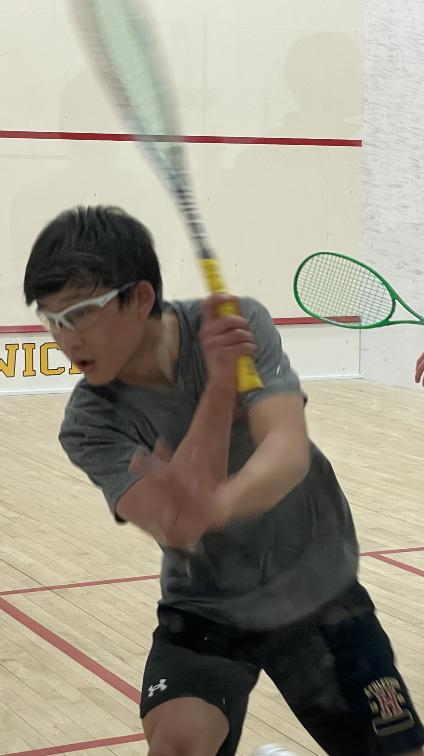
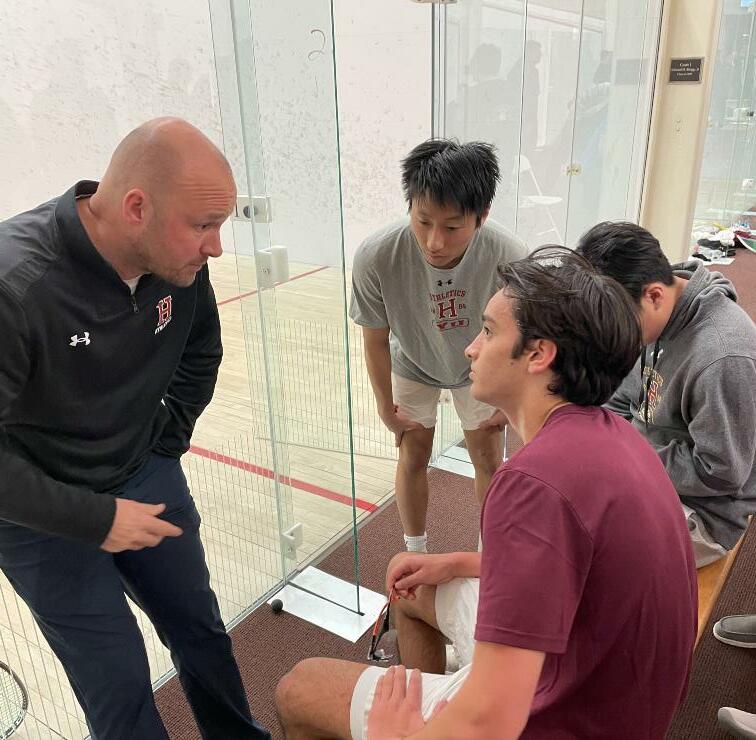
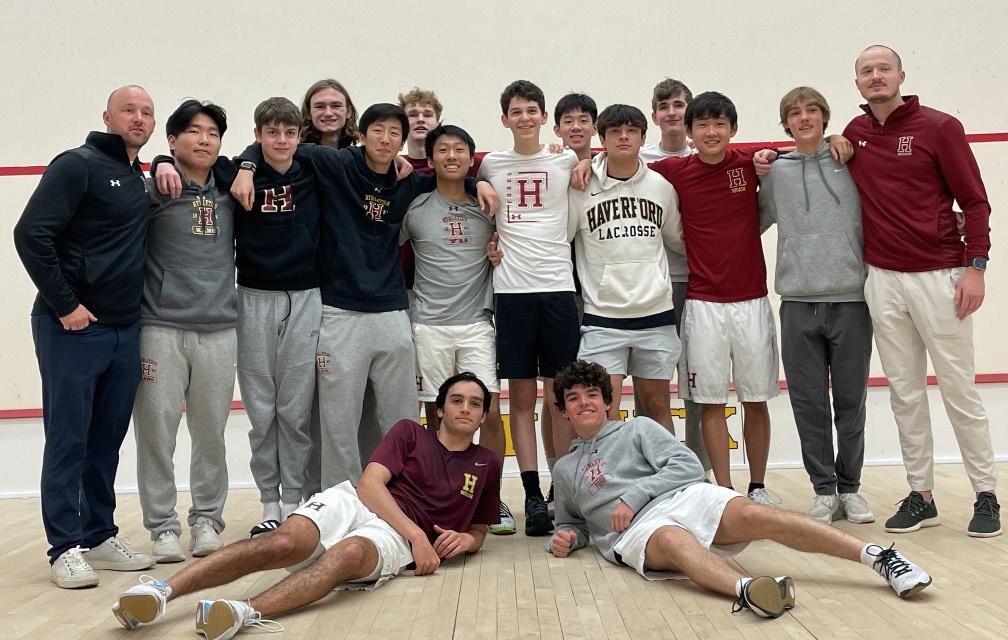
generations before us at our side. The team has taught me how to be a better leader, and most importantly, a better friend.”
With the departing Sixth Formers, the changing of the guard looks bright for Fords’ squash.
“The Fifth Form class has some of the most talented and gritty players I have ever seen. To those guys, I bequeath the title of being leaders of the storied Haverford School Squash Team,” Kang said. “Having gone through so much with them these past few years, I have complete trust in them to continue the amazing legacy we have.”
In the final weeks, the Haverford squash team has their eyes set on winning the national championship.
“Currently being undefeated and InterAc champions is reason to have our heads held high going into Nationals,” Kang said. “I expect great results from our guys.”
Ethan Chan ’23
The squash team poses after a successful weekend in Brunswick, CT, where they went undefeated over 3 matches
the index · sports February 2023 Page 22
COURTASY OF MICHAEL LEE
COURTASY OF TRACY LEE
Coach Alex Stait and Owen Yu ’23 coach Andrew Glaser ’24 in a 6-1 victory against Darien, January 21, 2023
COURTASY OF TRACY LEE
Devon Li ’25 plays against Brunswick in a 4-3 Victory, January 21, 2023
“The Fifth Form class has some of the most talented and gritty players I have ever seen.”
MATTHEW KANG ’23
“I expect great results from our guys.”
MATTHEW KANG ’23
Wrestlers feel confident heading into States
Wrestling requires both mental and physical preparation. Strength, speed, and agility are essential, and it is unique due to its mental aspect. To be successful in wrestling, one needs focus, strategy, and determination.
The team has had many moments of glory in the past, including National Prep Championships. Only a few years ago, however, the team struggled to fill spots.
Under the leadership of Head Coach Mr. Jesse Sataloff, and assisted by Coaches Mr. Chris DiBello, Mr. Anthony Pariano, and Mr. Ianny Dimitrov, the team has improved to an 11-3 record with big wins over opponents such as Springside Chesnut Hill Academy, where the score was 76-6.
Coach Sataloff attributes the team’s success to a team effort from the coaches, wrestlers, families, and alumni. In a recent 58-24 win over Germantown Academy, the team celebrated “senior night,” and the Sixth Formers were recognized by Coach Satalff with an emotional speech.
Sixth Former and Captain Billy Brosko used this speech as motivation to continue dominating.
“I feel confident about the team,” Brosko said. “I am excited for the rest of this season, especially being on the team with my brother and friends.”
This past season, new faces have stepped up and contributed to the team’s improvement.
On February 3rd, the team performed well against Episcopal Academy, winning 47-24 with an electric performance from
Fifth
The team has two more meets, at the Cougar Duals at MLK High School and Lower Merion High School, before the start of States and Nationals Tournaments.
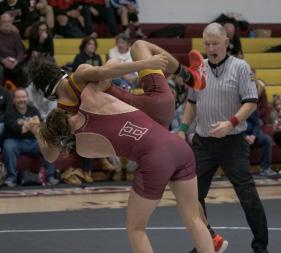
“If the team performs to its ability,”
Winter crew implements more flexible schedule at Roberts Road
Although dropping temperatures have curtailed the crew team’s time on the water, the team still practices together in an unofficial program at Haverford’s new campus on Roberts Road. The team practices four times a week, preparing rowers for the upcoming spring season.
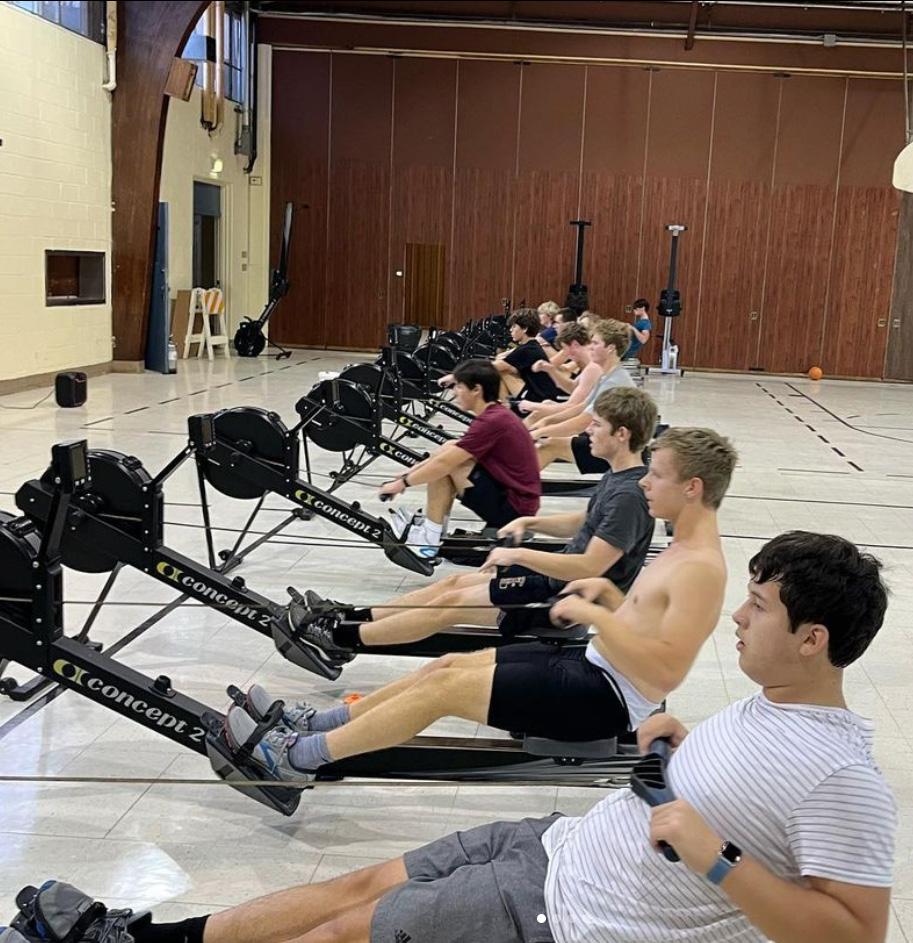
Changes in location and programming have increased attendance and team morale.
Previously, the winter crew program was stuck inside of the boat house at the Conshohocken Rowing Center. The longer drive caused extensive transportation issues, and the facilities were inadequate.
The space on Roberts Road is closer to Haverford’s main campus and much more spacious. “It’s not too shabby,” Fifth Former Ryan
Brewington said. “We are making the most of it with some good music.”
Along with a change in location, Head Rowing Coach Mr. Jonathan Stephanik and Sixth Form team captain Jack Squillaro have made schedule changes to appeal to more rowers. The four-day program now includes on Friday an alternate workout such as basketball. Morning lifts have been removed from the new system.
These changes in programming have caused a record number of students to sign up for the team.
“If we are able to see the improvement necessary and reach those [time] goals, I am very optimistic that this team will be very successful this spring,” Coach Stephanik said.
With the support of alumni, the crew team was able to purchase a new Empacher eight boat. This boat allows the team to compete at the varsity level in the most prestigious event for the first time.
The preparation during the winter crew program is crucial for the spring season’s success. The move to Roberts Road has allowed more people to participate in the unofficial program.
Past crew teams have been extremely successful and decorated during their spring season, and this year’s team looks to continue the winning legacy.
COURTESY OF HAVERFORDCREW
First day of
crew team’s
winter training, with some steady-state and cardio on the court
Former Daniel Kaiser.
Coach Sataloff said, “they will succeed, but success depends on the team’s mental and physical preparation.”
Michael Bartholdson ’25
the index · sports February 2023 Page 23
“I feel confident about the team. I am excited for the rest of this season, especially being on the team with my brother and friends.”
BILLY BROSKO ’23
Luke Fesnak ‘24 slams an opponent at the Buckley Duals
PIERCE LAVERAN ’24
Quinn Sullivan ’25
“It’s not too shabby. We are making the most of it with some good music.”
RYAN BREWINGTON ’24
Philadelphia hopes to flip the script on Super Bowl LVII
The Philadelphia Eagles stand just one game away from achieving football immortality. Led by Coach Nick Sirianni, the Eagles have had a historic season. With playoff appearances in just his two seasons, Sirianni proves that he is a key component to the Eagles’ success.
Under that strong leadership, the Eagles will face the Kansas City Chiefs in Super Bowl LVII.
The Super Bowl is on February 12, which falls during Black History Month. Super Bowl LVII will be historic, as it is the first Super Bowl featuring two Black starting quarterbacks. Jalen Hurts will be in the center of the spotlight for the Eagles. At just 24 years old, the explosive Hurts is one of the youngest quarterbacks to ever start in a Super Bowl.
On the Chiefs’ offense, Patrick Mahomes is no novice. This will be Mahomes’ third time in the Super Bowl, in addition to already having one ring in his collection.
The matchup of the quarterbacks is just one of many storylines for fans to watch.
For

While the game will be a thrilling conclusion to the Eagles’ season, many subplots arise surrounding the coming Super Bowl.
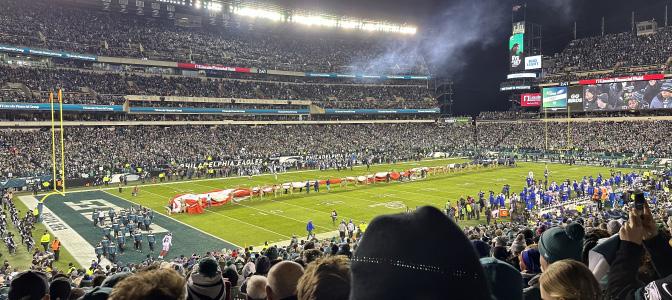
This Super Bowl has also been referred to as “The Kelce Bowl.” For the first time in Super Bowl history, two brothers will play against each other. Fan favorite Jason Kelce will play center for the Eagles, with his younger brother Travis on tight end for the Chiefs.
In addition to the Kelces, there’s also a revenge story looming.
The Chiefs are coached by Andy Reid, who has enjoyed great success in Kansas City. He has accumulated a handful of Conference Championships and one World Championship. Before his tenure in Kansas City, Reid spent thirteen years as the head coach of the Eagles. He brought the Eagles within reach of a championship but fell short against the New England Patriots. Reid brought pain to Eagles fans for many years, and Philadelphia wants to flip the script and beat him.
Thousands of Eagles fans rejoiced on Broad Street in February 2018, donning their midnight green, celebrating the Eagles’ Super Bowl victory. Five years have passed, and Philly hasn’t felt that joy since.
Philly fans have endured many heartbreaks recently, most notably with the Phillies and the Union losing in the championship games. But the Eagles finally have a chance to break the cycle of falling short. Eagles fans across the world have been waiting for this moment.
Adrian’s speech to Rocky in the Philadelphia classic Rocky II echoes a similar sentiment. She asks Rocky to do one thing for her: “Win.”
Go Birds. It’s time to grease the poles.
the index · sports February 2023 Page 24
Colin Toth ’26
the first time in Super Bowl history, two brothers will play against each other.
But the Eagles finally have a chance to break the cycle of falling short. Eagles fans across the world have been waiting for this moment.
While the game will be a thrilling conclusion to the Eagles’ season, many subplots arise surrounding the coming Super Bowl.
The American flag is unravelled before the Eagles’ game against the Giants, January 29, 2023
Follow @haverford_index on Instagram for the latest articles right in your feed!
CONNOR PINSK ’23






















 Ford ’24
Ford ’24




























 ’25
VIA WIKIMEDIA COMMONS
’25
VIA WIKIMEDIA COMMONS






